PROOF
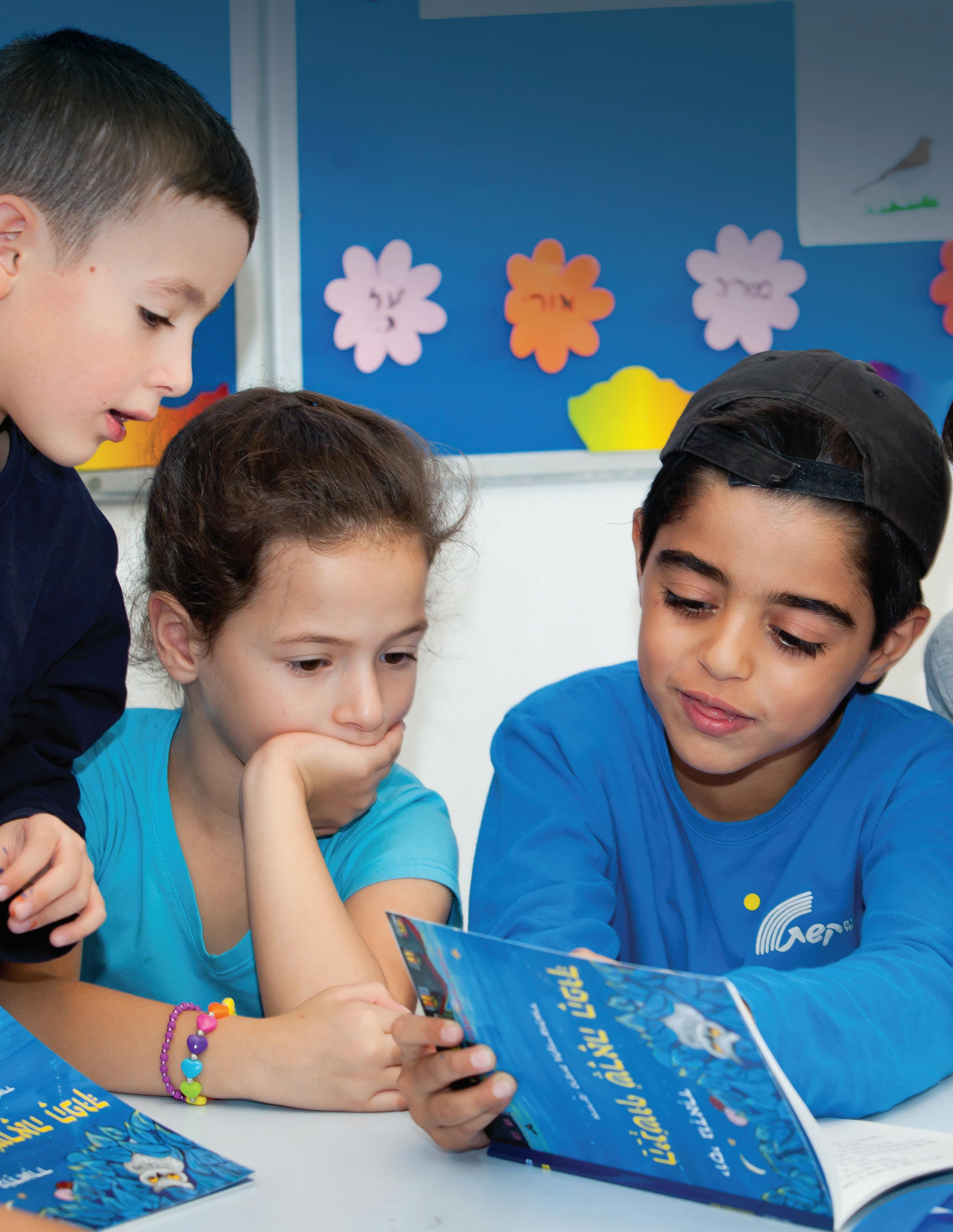
Jewish parenting post-October 7 p. 16
How does PJ Library reach newborns? p. 6
Bringing Jewish connection to Turkey p. 14


Jewish parenting post-October 7 p. 16
How does PJ Library reach newborns? p. 6
Bringing Jewish connection to Turkey p. 14
Summer 2024 | Volume 10, Issue 19
Founder Harold Grinspoon
President Winnie Sandler Grinspoon
Chief Operating Officer Adrian Dion
Executive Director Alex Zablotsky
Chief Philanthropy Officer
Rachel Bren Goldklang
Director of Advancement Communications
Shelley Friel
Managing Editor Rachel Zaimont
Graphic Designer Allison Biggs
Contributing Editors
Senior Creative Manager Beth Honeyman
Creative Director Danny Paller
Contributing Writers
Micah Blachman, Patrick Coyle, Naama Krauz, Saskia Swenson Moss, Kayla Reisman, Naomi Shulman, Ryan Torok, Rachel Wetter, Sivan Zakai, Ph.D.
Operations Support
Director of Data Management
Adrianne Levine
Senior Manager of Print Production & Distribution Renée Zborowski
Web Marketing Manager Rory Hurlburt
Stewardship Coordinator Jessica Kaleta
Database Coordinator Sherani Weatherington
Web Operations Associate Xavier Hillman
PROOF subscriptions: development@hgf.org
Donation inquiries: give@hgf.org
Questions about PJ Library: pjlibrary@hgf.org
Have a story idea? proof@hgf.org
Cover credit: Courtesy of Keren Grinspoon Israel
PJ Library
67 Hunt Street, Suite 100 Agawam, MA 01001 USA
413-276-0800 pjlibrary.org
Copyright © 2024 Harold Grinspoon Foundation. All rights reserved. No part of this publication may be reproduced, distributed, or transmitted in any form or by any means without prior approval.
Iwrite this in June as hostages are still being held, as we see heart-wrenching images of innocent lives lost, and as we hear — and feel — loved ones’ grief. We've seen thousands arrested in protests on college campuses, Israel is front-page news every day, and here at PJ Library, we hear from parents expressing a range of beliefs on the way forward. By the time you read this, we’ll surely be in a different place, but I suspect times will be no easier.
As parents, we strive to teach the fundamental Jewish belief that every person is created b’tselem Elohim, with sacred worth, and that both Israelis and Palestinians deserve safety, freedom, and dignity. We struggle to explain why these ideals are so difficult to achieve.
In the pages that follow, you’ll find avenues to talk to your kids about Israel — the land and its people as well as the conflict.
Turn to page 10 for a story about Israel that won’t make prime-time news: one of a committed team that has gone above and beyond to help Israeli children of all backgrounds and faiths during an unthinkable time.
And, just as we adults grapple with adult-sized questions in today’s world, we have children looking to us for answers to their own hard questions. That’s why I’m so thrilled that social scientist Sivan Zakai, Ph.D., provides her expert guidance on page 16 — a welcome buoy in uncharted parenting waters.
Across these pages, I hope you’re reminded again and again that you are not alone. As a PJ Library parent, grandparent, or supporter, you are part of a global community doing the important job of raising the next generation of Jewish leaders.
In partnership, for our children, with prayers for peace and security,
Rachel Bren Goldklang Chief Philanthropy Officer PJ Library
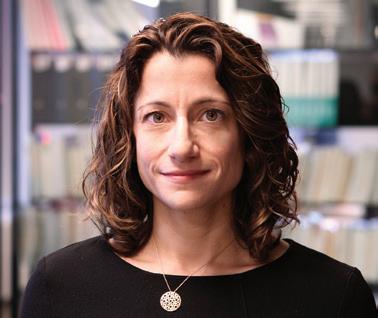

Delivering for Israel’s Children
Under extraordinary circumstances, PJ Library in Israel responded to families’ needs after October 7.
“Reaching Families Right from the Start PJ Library partners with mohels, introducing young families to the gift of Jewish books.
Jewish Joy for the Very Young Israeli author and illustrator Varda Livney delivers comfort for PJ Library’s youngest readers.
Jewish Connection in Turkey
A new PJ Library launch provides learning, fun, and fortitude for Turkey’s Jewish community.
Our Kids’ Hardest Questions
Children must navigate a world marked by antisemitism and war. Here are tips for parents.
Small but Mighty
For small PJ Library communities, a bit of smart funding can go a long way.
Lessons I Learned from PJ Library
Micah Blachman has been receiving PJ Library books for most of his life. He shares his favorites. 4 The Newsfeed
A quick take on what’s happening at PJ Library. 22 Donor Spotlight
The story of a special double bat mitzvah.
Parting Thoughts
A note from Winnie Sandler Grinspoon, president of the Harold Grinspoon Foundation.
We absolutely love PJ Library and the books we’ve received so far! Joseph Had a Little Overcoat is my twin boys’ absolute favorite, especially when we sing and play music while turning the pages! One thing I observed immediately is that families and children of diverse backgrounds are represented in many of the books. This is extremely important to me as a family of people with various shades of brown skin. I love that my boys see themselves and our family in books like Shabbat Shalom, The Shalom Book, and A New Week. Although I have Jewish ancestry, I did not grow up going to shul or learning about the spiritual and practical gifts of Judaism. I felt called to reconnect with Judaism a few years ago and have felt so much joy and peace that I’m excited to pass on to my children.
We chose to make a donation because we are so grateful for PJ Library and the opportunity to teach our children about life through Judaism. We are so thankful for the founder’s vision and the members who continue to pass on the gifts of our Jewish ancestors from generation to generation. We feel so much joy every time we receive a new book and it keeps our faith and traditions fresh and fun in our home. We wholeheartedly wish to share the same joy and learning with other families.
Shalom, The Rouse Family
*We want to hear from you! Send your thoughts, questions, and opinions on the articles in PROOF (and PJ Library in general) to proof@hgf.org.
There’s always plenty going on at PJ Library. Here’s a quick roundup of the latest news and events.
BY PJ LIBRARY STAFF
THERE’S MORE TO PJ LIBRARY THAN BEAUTIFUL JEWISH BOOKS. PJ Library helps to connect families within their local Jewish community and make joyful Jewish rituals accessible. That’s why PJ Library offers Get Together, an incentive designed to encourage families to host small gatherings for Jewish holidays (or just everyday fun!). Welcoming guests, or hachnasat orchim, is a core Jewish value, and PJ Library aims to make it easy.
How does it work? When you apply to host a Get Together, you’ll invite two or more other Jewish families for a Jewish-inspired social event: a Shabbat celebration at home, a picnic and PJ Library storytime at the park, a tikkun olam volunteering project, an adults-only social outing, or any other creative gathering you choose. PJ Library helps cover the cost.
The result? In 2023, more than 14,000 families in the US and Canada hosted or attended a Get Together. Last December alone, host families submitted a record 2,500 applications when PJ Library invited hosts to welcome non-Jewish families as guests for Hanukkah.
“Our Get Together was wonderful,” shares Iyar Mazar of Boston, Massachusetts. “PJ Library provided the motivation and means to bring our families together and grow closer.

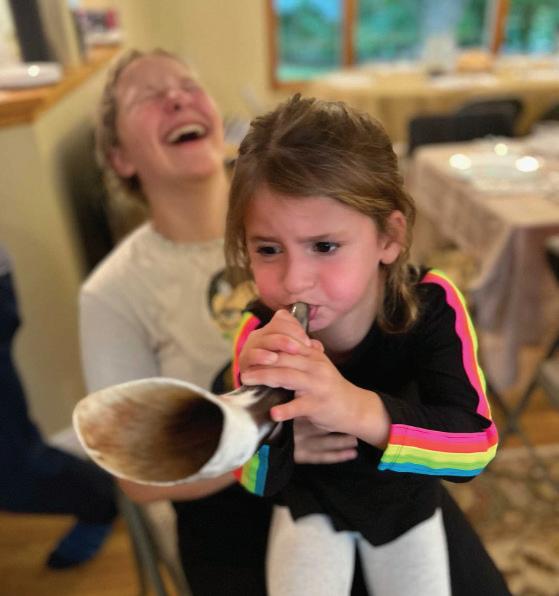
Get Together gatherings spark Jewish joy.
PHOTOS COURTESY OF JACQUELINE
SPERLING
HOSSEINI, REBEKAH RAZ, AND MICHELE LINDER
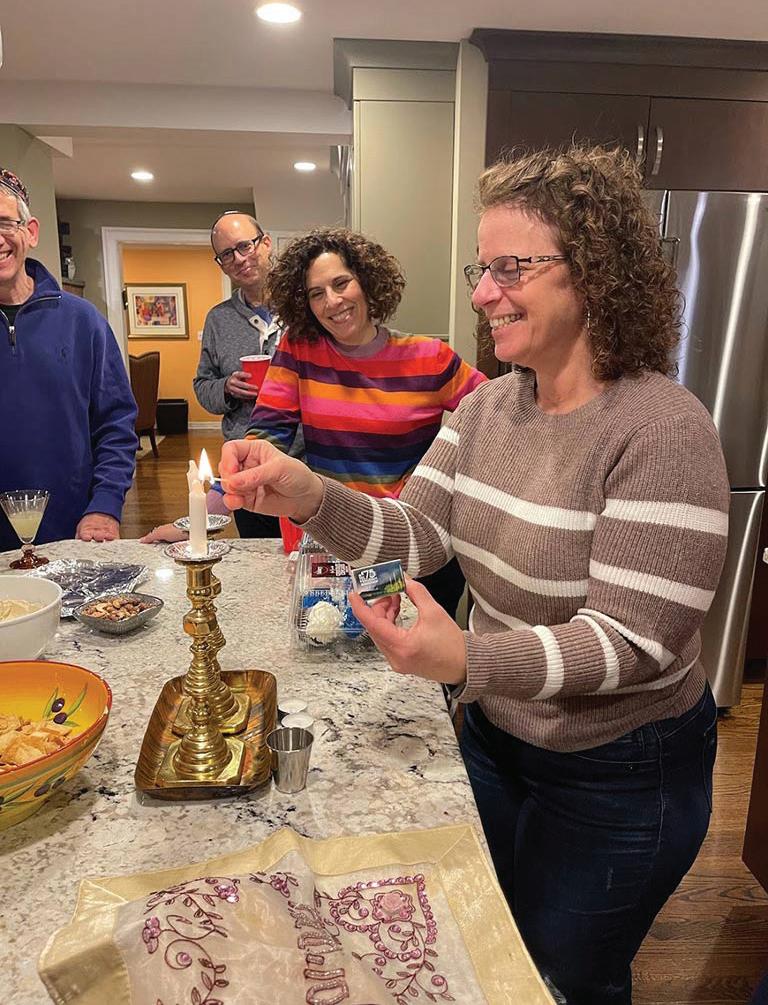
It was a lovely time for the kids and very helpful for the adults to feel supported by others. I’m looking forward to hosting future events.”
The Get Together program is currently offered in more than 160 communities across North America. To learn more, including how to support Get Together or bring the program to your community, visit pjlibrary.org/gettogether or email engagement@hgf.org
—By Rachel Zaimont
The Jewish community worldwide felt the rise in antisemitism and anti-Israel sentiment after October 7. Children’s book authors were no exception. In response, PJ Library hosted three virtual support sessions for Jewish kidlit creators, offering guidance on how to navigate and respond to antisemitism online and in their industry.
Held between November and January, the sessions drew hundreds of registrants. Experts from the AntiDefamation League shared tips on staying safe and empowered in virtual spaces. Authors discussed ways to have their voices heard at literary and educational conferences. Agents and publishers broached the challenges in the publishing world today.
“I have been struggling with how Jewish to keep my focus, and this reminded me to fully embrace Jewish themes proudly,” wrote author and illustrator Erica Weisz. Added writer Vicki Kleinman, “This was a wonderful, heartbreaking, enlightening, love-filled, encouraging presentation. What helped the most was not feeling so alone.”
—By Patrick Coyle
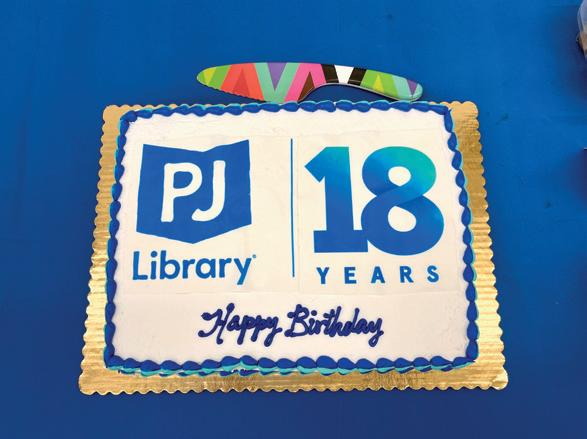
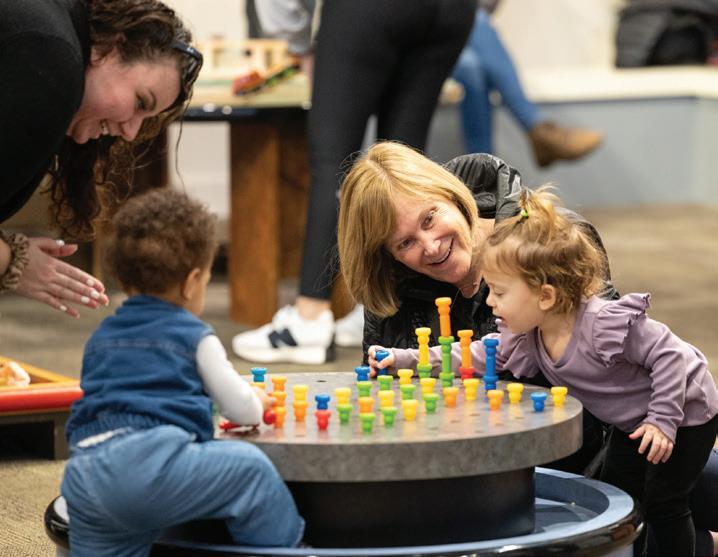
This year, PJ Library marked an exciting milestone: 18 years of sending books to Jewish children around the world (18 stands for chai — Hebrew for “life”). To celebrate, the Harold Grinspoon Foundation offered grants to PJ Library communities across the US and Canada to host engaging family programs and help spread the word to even more potential subscribers.
Between December and June, nearly 40 communities hosted PJ Library birthday parties and holiday celebrations that attracted more than 3,000 families. Programs included group outings to children’s museums, zoos, and play spaces; PJ Library-themed birthday party festivities; and special appearances by PJ Library authors, storybook characters, influencers, and musical guests. It wasn’t only about the kids; communities hosted social events for the PJ Library parent crowd too.
“I’m super pleased with how our event turned out,” says Yael Dyckman, PJ Library coordinator in Eugene, Oregon. “It was a warm, festive afternoon and event attendees had a wonderful time. Many families commented, ‘Wow, I see a lot of new faces. Our community is growing.’”
—By Kayla Reisman
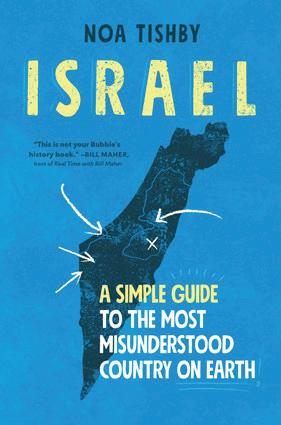
Early in 2023, with support from Micah Philanthropies, PJ Library founder Harold Grinspoon offered subscriber families a free copy of Israel: A Simple Guide to the Most Misunderstood Country on Earth by Noa Tishby. After the October 7 attack and amid the global surge in antisemitism that followed, he renewed the offer. The book, he felt, could help readers process the tragedy, understand Israel’s history, and provide context in difficult conversations.
The response was enormous: In just over a week, more than 17,000 families in the US, Canada, and the UK requested a copy (clearing our shelves!). PJ Library sent another 2,000 copies to young adults in partnership with Masa Israel Journey and Hillel International. In all, PJ Library has given away 30,000 copies of the book.
“I have never felt as connected to my Jewish identity as I have since the events of October 7, so I picked up the book and began reading,” wrote Andrea Reavis of Denver, Colorado. “For me it has been a revelation. It helps me feel less helpless. Thank you for arming me with this knowledge and for understanding how vital it is that our children are connected to Judaism.”
—By Rachel Zaimont

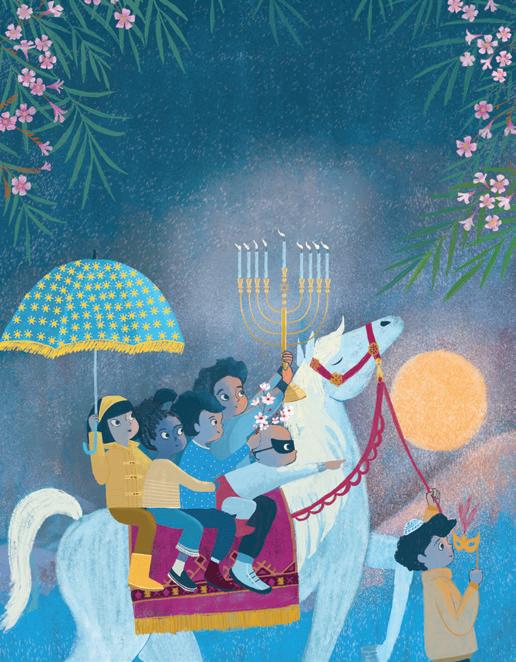
Before Rosh Hashanah last year, many families were delighted to receive a copy of A Time to Grow: A PJ Library Guide for Starting the Jewish New Year. But what they didn’t know is that this guide is just the beginning. Next up? A Time to Hope: A PJ Library Guide for Hanukkah Through Purim, which we piloted this past winter.
Parents’ feedback on this latest guide has been glowing: “Beautiful, well thought-out, and most importantly, useful.” “My family’s Jewish celebrations fall on me, and it gave me confidence to do rituals and activities with my kids. This guide made me proud to be Jewish.”
Thanks to donor support, A Time to Hope will be sent to families in October. And in the future, we hope to release more holiday guides, including A Time to Gather: A PJ Library Guide for Passover Through Shavuot and a two-book set on Shabbat called A Palace in Time (in development with initial support from the Joyce and Irving Goldman Family Foundation). We hope these new resources enrich family celebrations throughout the Jewish year.
—By Danny Paller
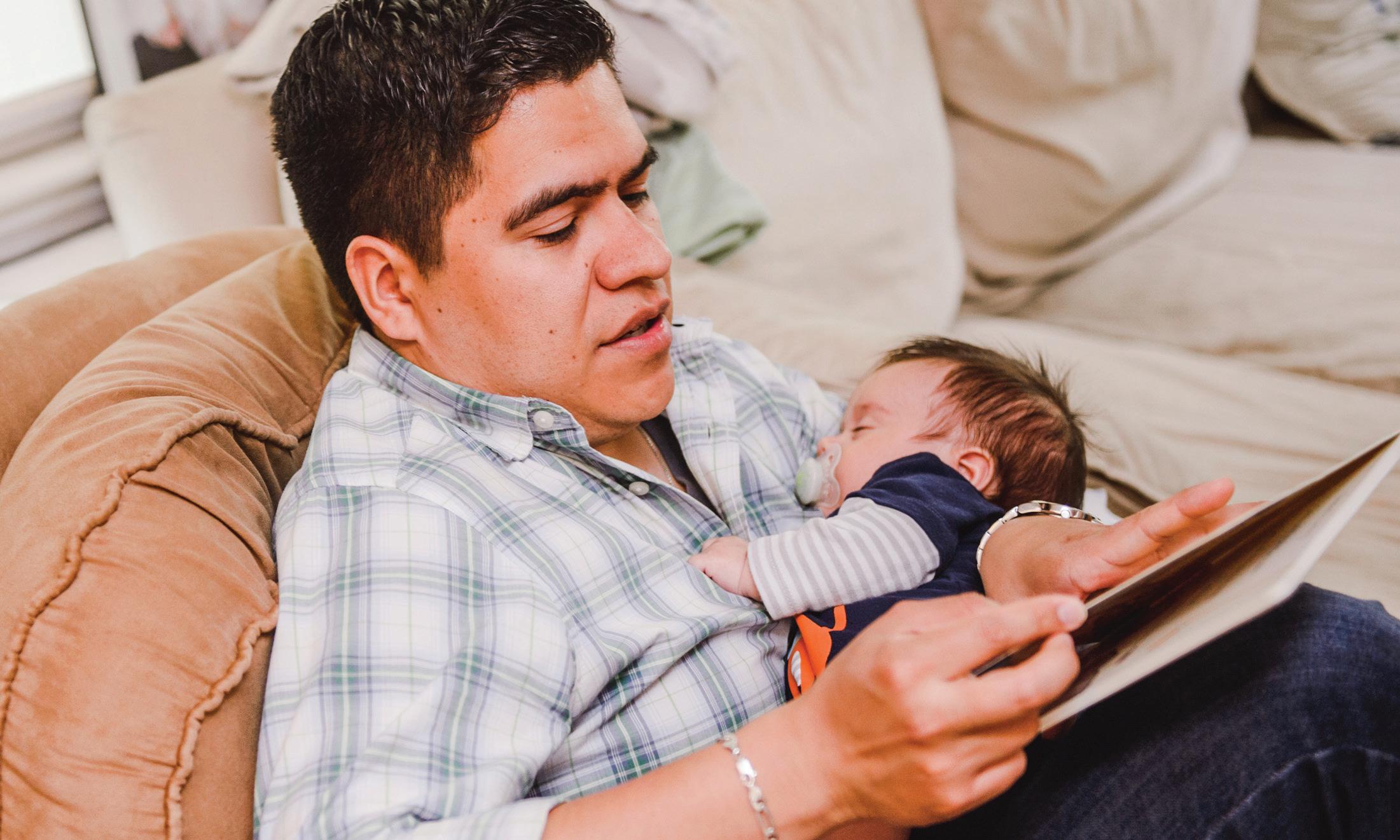
PJ Library now partners with professional mohels, introducing young Jewish families to the gift of beautiful Jewish books.
BY NAAMA KRAUZ, ENGAGEMENT MANAGER
When Leandra and Adam Kol first met via a Facebook group for single vegans, they had no idea they would soon find themselves happily married, about to purchase a new house, and snuggled up with their infant son Josh as they navigated the newness of Jewish parenting.
Leandra converted to Judaism after being drawn to it for years and has joyfully leaned on Adam’s family to help envision their son’s Jewish upbringing. Their first step? Hiring a mohel to perform a bris, the ritual circumcision traditionally done when a baby boy is 8 days old. When Mohelet Elise Leonard, M.D., arrived at the Kols’ Hollywood, Florida, home last October, she brought a surprise — a PJ Library swag bag stuffed with board books, a PJ Library lunch bag, baby items, and sign-up information for the family.
Mohels, doctors, rabbis, and doulas can all help families bring Judaism into their homes.
PHOTO BY KATIE SLATER
“Receiving the PJ Library bag was such a nice gift we weren’t expecting,” recalls Leandra. “Having the bag there as a reminder to sign Josh up for PJ Library during the chaos of the first few weeks after having a newborn was fantastic.”
PJ Library is constantly seeking out new ways to reach young families. That’s why the organization has embarked on a new initiative: engaging mohels, rabbis, and pediatricians across the US and Canada to become PJ Library ambassadors. Through these strategic partnerships, PJ Library can reach families from the birth of their child and welcome them into the PJ Library community with a uniquely personal touch. The goal? To help more families get an early start building a strong Jewish identity for their children with the help of PJ Library stories and resources.
“What else can I do to help clients raising Jewish families? It can’t get better than PJ Library.”
—Mohel Michael Blum, D.O.
“One of the first ways families can start their Jewish journeys begins with a mohel,” says Sara Kibel, director of community engagement for PJ Library in the UK, who conceived of the partnership. “If that mohel can gift families a book and subscription information, it will enable the family to have a monthly dose of Judaism right from the start.”
In 2019, Kibel began handing out PJ Library books to mohels, hoping they would gift them to families welcoming baby boys with a bris. Mohels soon started contacting Kibel to request more books as they ran out. UK mohels handed out 250 books in 2023 and are on track to surpass that number in 2024.
Following the success of the UK program, the US initiative launched in 2022. PJ Library has so far partnered with more than 100 mohels and sent nearly 1,700 gift bags to be distributed to families in the US and Canada. The team hopes to expand its reach through relationships with professional organizations including the National Organization of American Mohalim/Mohalot (NOAM, a program of the Union for Reform Judaism), Brit Kodesh (a program of the United Synagogue of Conservative Judaism), and a network of Orthodox mohels.
“Mohels support families during the milestone of welcoming a new child,” says PJ Library outreach officer Kayla Reisman, who spearheads the mohel project in the US and Canada. “Through our partnership, they can bring families the gift that keeps on giving: an ongoing subscription to PJ Library.”
It’s not only baby boys who benefit. PJ Library also reaches families welcoming infant girls by partnering with doulas, doctors, and rabbis who help spread the word at appointments and baby-naming ceremonies. Alison Goldberg, engagement lead for PJ Library in New York, is proud of the 20 mohels and doulas who share the gift of PJ Library with new parents they meet in the greater New York region. One of them shared, “I am honored to be a shaliach (emissary) for PJ Library. It is a great cause.”
Mohels say that no matter how connected their clients are to their local Jewish community, they are eager to seek meaningful Jewish resources once a new baby arrives.
Mohelet Sarah Grope, M.D., says she has worked with interfaith families in Denver, Colorado, who are excited to learn about PJ Library. “One family said to me, ‘This has been amazing! I didn’t know about all the Shabbat symbols, but then we got this Shabbat board book, and now I know. I got to learn with my child without feeling embarrassed that I didn’t know these things,’” Grope shares.
In Toronto, Ontario, Mohel Aubie Diamond, M.D., has handed out over 150 PJ Library bags to families. “Giving families the gift of PJ Library at the beginning of their parenting journey means they are going to start reading Jewish concepts about family and values,” he says. “It gives the family a chance to learn from the children — from the bottom up instead of the top down.”
As a member of partner organization NOAM, Dallas, Texas, mohel and pediatrician Michael Blum, D.O., appreciates the opportunity to spread the word about PJ Library — especially to grandparents. As a grandfather himself, he knows children eagerly snuggle into their grandparents’ laps for storytime, creating crucial moments of connection for Jewish families. “As a mohel, this is a wonderful way to help these families bring Judaism into their homes,” Blum says. “As a pediatrician, promoting Jewish literacy is an extension of my ability to help young Jewish families.”
For the Kol family, PJ Library books offer a dual benefit: They allow Adam to reconnect with the Jewish joy of his youth and provide a gateway for Leandra to continue her own Jewish growth.
“Consistency is very important to us,” says Leandra. “Josh will be raised with Jewish values, so having a nightly tradition of reinforcing our Judaism allows us to continue our own Jewish learning while bonding with our son. Even now more than before, given what’s going on in the world, we’re looking forward to giving Josh a strong Jewish foundation.”
Families who discover PJ Library through their mohel are some of the nearly 4,000 families who sign their children up every month. Make a gift today to welcome the newest members of the Jewish community and keep PJ Library free for families. Visit pjlibrary.org/proofgift.


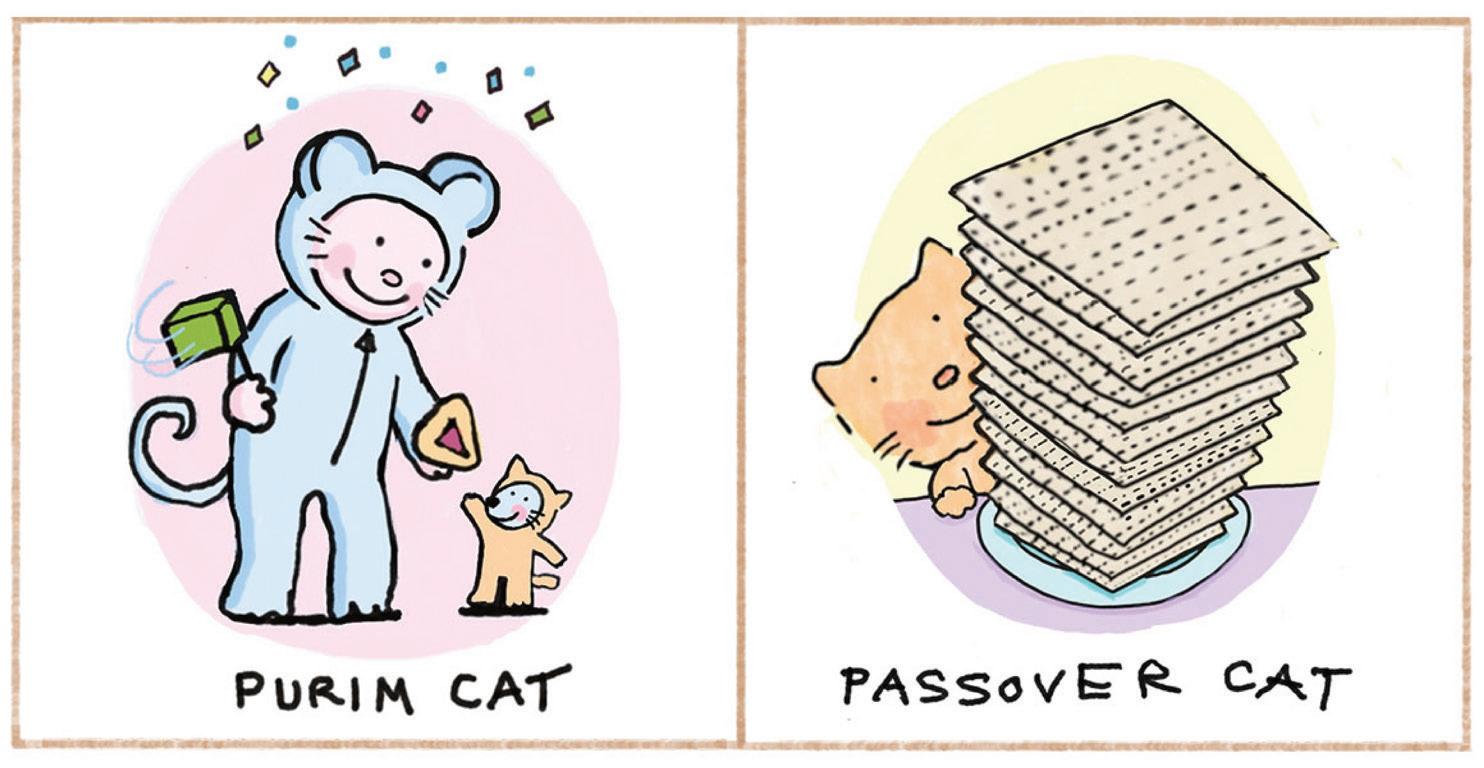
Israeli author and illustrator Varda Livney delivers humor — and comfort — via the inviting cast of characters she creates for PJ Library’s youngest readers.
BY NAOMI SHULMAN, MANAGING EDITOR OF PJ PUBLISHING
Only about 1% of the manuscripts PJ Library receives from authors are selected to become PJ Library books, so having one of your books chosen is a big achievement. Having five of your books chosen? That’s an enormous accomplishment, and Israeli author-illustrator Varda Livney is one of few authors who has done it. If you’ve had a baby or toddler enrolled in PJ Library in the past few years, chances are you’ll recognize Livney’s cozy, funny bunnies (and other characters). Her latest book, Jewish Cats All Year Round (PJ Publishing, 2024), will be sent to families of infants in August. PROOF chatted with Livney about her inspiration for creating these books and how writing and illustrating has kept her going through especially challenging times.
Naomi Shulman: You didn’t start out as a children’s book author. How did you end up doing what you do now?
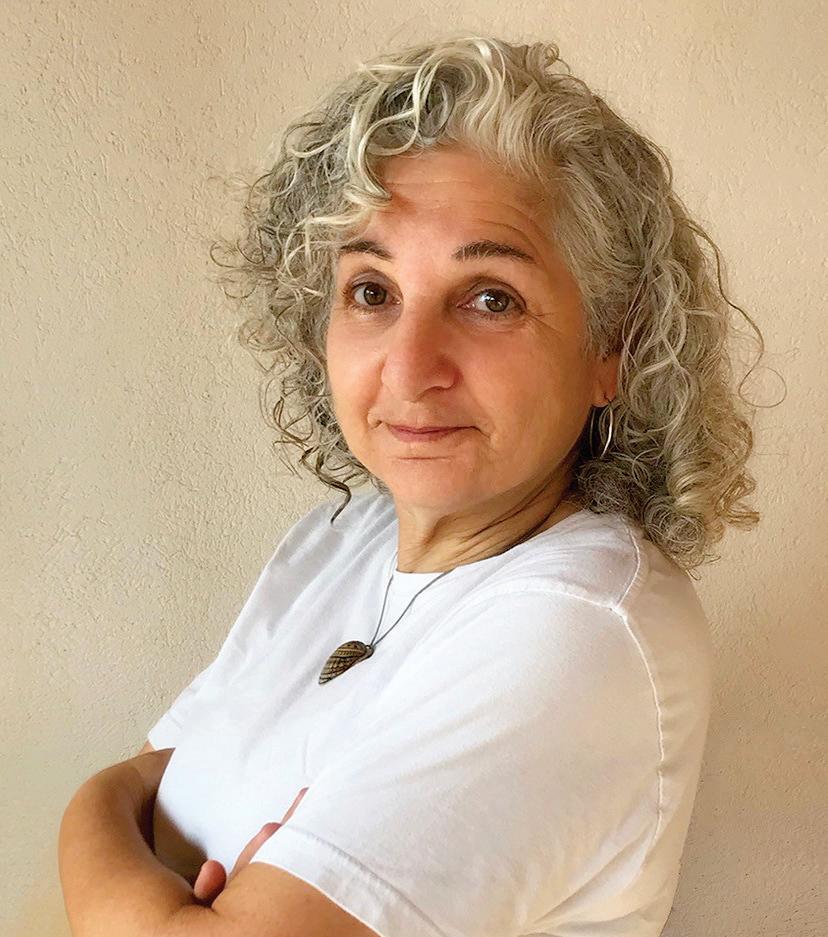
Varda Livney: I started out in advertising, but then I began creating greeting cards. Writing greeting cards is kind of like writing really short books, which is perfect when you’ve got little kids and a short attention span! Around that same time, I got my foot in the door at Simon & Schuster, illustrating children’s books — and then I wrote and illustrated one of my own: What I Like About Passover (Little Simon, 2002). Then my kids grew up and didn’t need as much care, so I decided to try my hand at books again.
COURTESY OF VARDA LIVNEY
NS: You create board books geared toward the very youngest audience: babies and toddlers. What inspires you to make your books? Do you have children in your life who you have in mind as you create?
VL: I had a very warm and fuzzy Jewish upbringing. I want to help share that with

other people, and it starts from babyhood. When you’re little, you’re a sponge. Things are familiar to you growing up, and you might not even remember later why you know it. My kids were very inspiring, but they’re grown, and they don’t do the same funny little toddler things. But now I have a great-niece and a great-nephew, and they’re just as funny. I like humorous books, and I want my books to be fun for parents to read too. When I’m working on my projects, I’m amusing myself and hoping they’ll also entertain other people.
NS: You’re originally from the US, but now you live in Israel. I imagine this year has been hard; how are you in this moment?
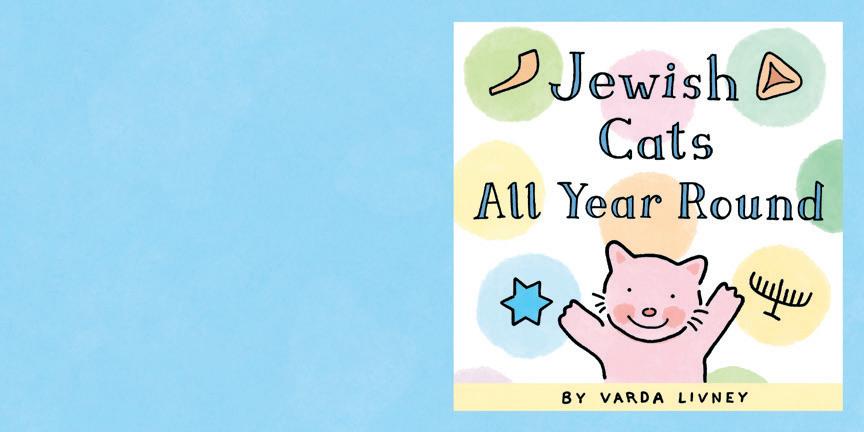
VL: I’m lucky — my immediate family is safe. The first week [after the October 7 attack], everyone was in shock and horror. Then people went into Jewish-mama mode, making meals, and collecting and sending items. Everyone came together. The younger generation, they’re so amazing. There have been a lot of people helping each other and showing up for each other. I’m never going to be the head of a peace movement, but what can I do? I hope to help bring about world peace through drawing bunnies. Art is absolutely an outlet for me.
NS: We’re excited to send out your latest PJ Publishing book, Jewish Cats All Year Round, which shows cats (and mice) celebrating Jewish holidays. What inspired this one?
VL: A few months ago, we had some cousins from Texas visit, and the kids kept count of how many cats they had seen running around Israel. I don’t think cats are inherently funny — but a cat making sukkah decorations? Now that cracks me up. I hope babies and families will find it funny imagining their cats or dogs or parakeets making sukkah decorations or blowing a shofar.



NS: PJ Library has sent out a lot of your books, some of which have been published by PJ Publishing (our in-house imprint) and brought to market with the support of committed funding partners. How has your relationship with PJ Library encouraged you?
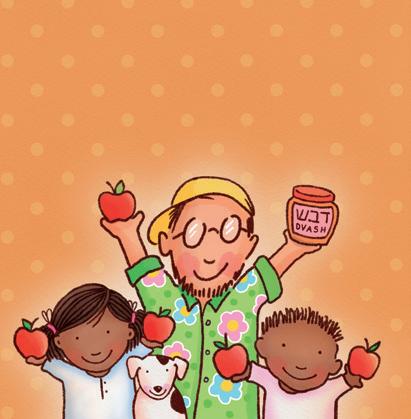
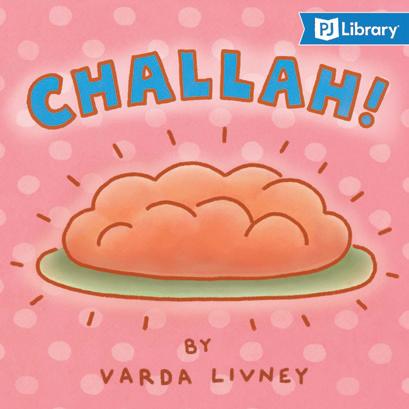
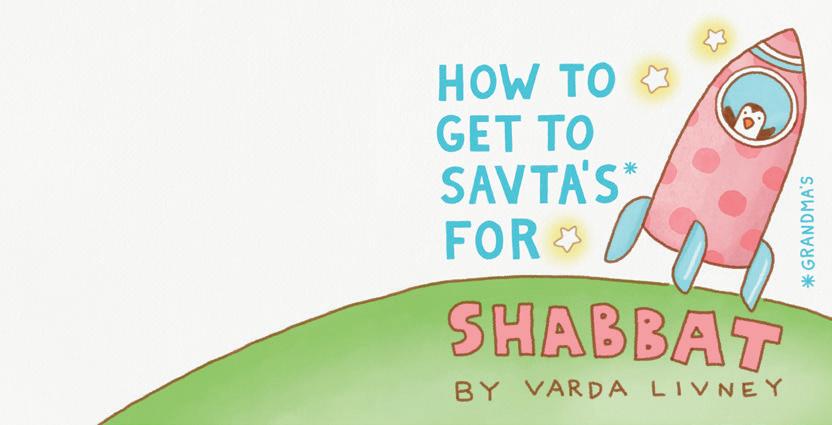
Jewish Cats All Year Round
Age 0
PJ Publishing
Jewish cats (and their mouse friends) celebrate Jewish holidays all year long … and so can Jewish babies!
VL: I am a total PJ Library fangirl. Besides putting books in kids’ hands, Harold Grinspoon and the crew have helped make it possible for writers and illustrators to spend more time doing what they love and believe in and less time waitressing!

Rosh Hashanah with Uncle Max
Age 1
Kar-Ben Publishing
Today is Rosh Hashanah, the Jewish New Year, and the whole family is coming together to celebrate.
Challah!
Age 3
PJ Publishing
Louis is a Shabbat-loving baby bunny whose first — and only — word is “challah!” Will his parents ever get him to say anything else?
How to Get to Savta’s for Shabbat Age 3
PJ Publishing
Through the jungle, down the slide, up to the moon, and onto a cloud … this journey to Shabbat dinner is full of adventure!
Hanukkah at Monica’s Age 3
PJ Publishing
Monica’s house is the place to be for a candle-lighting, dreidel-spinning, latke-frying good time. Octopuses, jellyfish, and robots all agree!

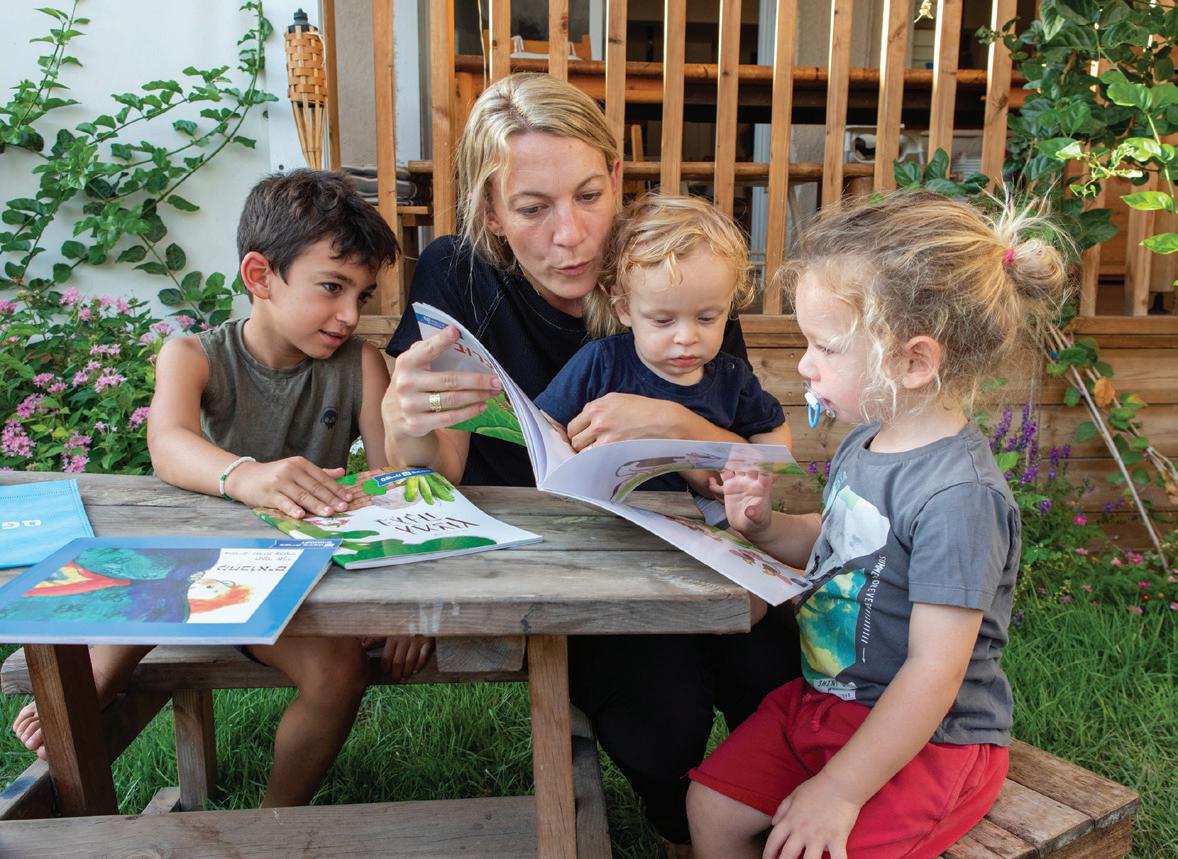
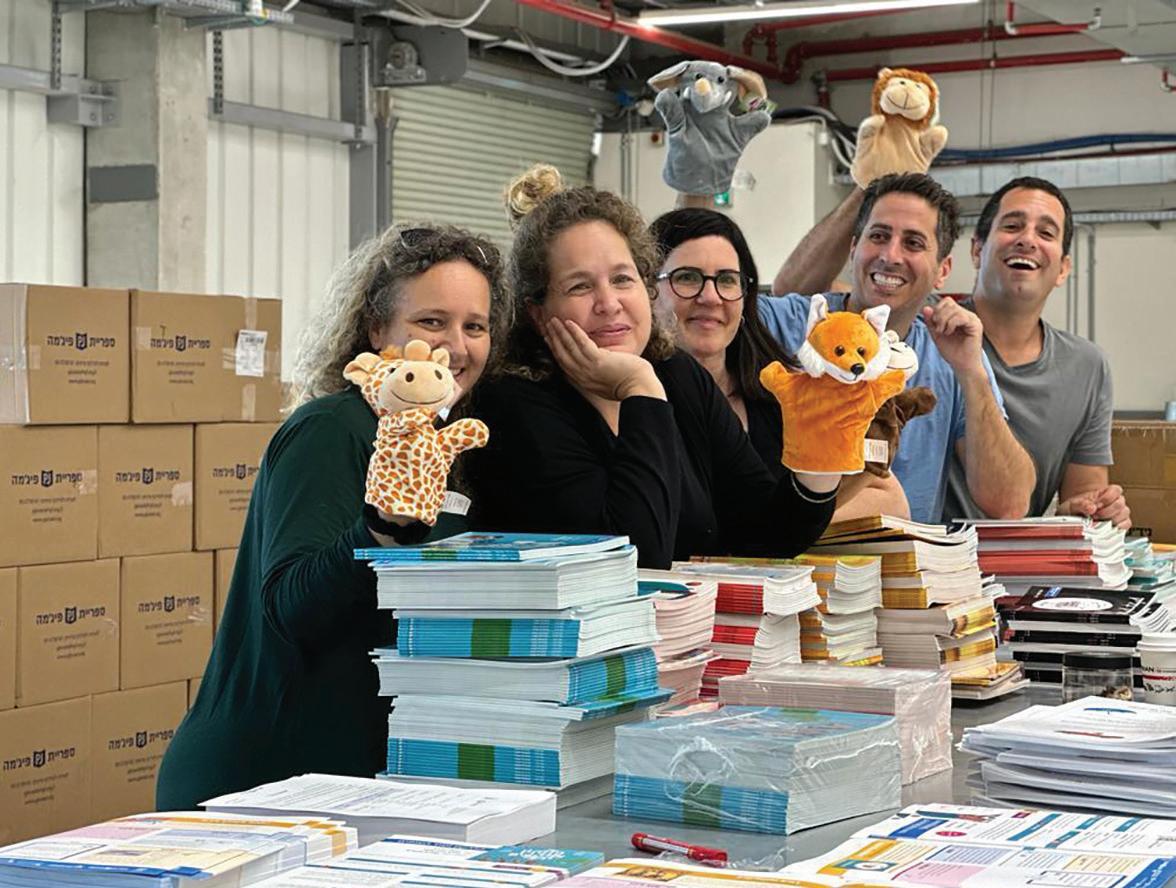
Under extraordinary circumstances, PJ Library in Israel pivoted to respond to families’ needs after October 7.
BY RACHEL ZAIMONT, MANAGING EDITOR
Grief and tumult marked the first weeks after the October 7 attack in Israel. Families watched in horror as the news named hostages and relayed the death toll. Schools and businesses closed. More than a quarter of a million Israelis fled their homes for evacuee centers as rockets exploded over cities and towns. Educators and government officials scrambled to care for one of Israel’s most vulnerable populations: young children. In the Dead Sea region, where seven displaced communities sought temporary refuge, Vivian Terkel-Gat helped establish kindergartens at hotels and other shelters for evacuees. Terkel-Gat, an early childhood coordinator with Israel’s Ministry of Education, strove to give children a much-needed sense of routine. But necessities, such as books and art supplies, were scarce.
In Israel, children receive books in class and take copies home. Keren Grinspoon Israelʼs staff stepped in to pack stories and activities last fall.
PHOTO S COURTESY OF KEREN GRINSPOON ISRAEL
Then a crucial gift arrived: hundreds of activity kits filled with children’s books, craft materials, ideas for games, and discussion prompts based on the stories. The kits bore a beloved logo — that of Sifriyat Pijama, PJ Library’s sister program in Israel.
“When the Sifriyat Pijama packages arrived in small, perfectly organized boxes, it was a glimmer of hope in the midst of despair,” Terkel-Gat recalls. “For the educators, these books were a lifeline that enabled them to continue teaching despite the challenging circumstances. The children were delighted as they received books that felt familiar, and the creative kits gave them an outlet for expression. It was heartwarming to see them engage with these resources, finding moments of joy and normalcy amid the chaos.”
Sifriyat Pijama (“Pajama Library”) is a household name for more than 350,000 Israeli Jewish children growing up on the brand’s
vibrant Hebrew-language books. Just as recognizable is Maktabat al-Fanoos (“Lantern Library”), a companion program that brings culturally appropriate books in Arabic to 170,000 Israeli Arab children. Keren Grinspoon Israel (KGI), the Harold Grinspoon Foundation’s presence in Israel, oversees both programs in collaboration with the Israeli Ministry of Education.
Founded in 2009, KGI delivers monthly books to children ages 1-8 at school or in day care, where teachers incorporate the stories into their lessons before kids take their own copies home. But for a time, the war changed everything.
Marshaling its resources, partnerships, and donor support, KGI mounted an extraordinary emergency response for Sifriyat Pijama and Maktabat al-Fanoos families in the aftermath of the attack. With care and speed, KGI provided books, programming, and vital connection and comfort to families across Israel — wherever they were — in a time of tragedy.
“Our team responded to families’ needs with incredible strength and creativity under the most horrific circumstances,” says Andrea Arbel, executive director of KGI. Adds Inbal Tofach-Ben Hevron, director of Sifriyat Pijama, “We kept thinking, ‘What do families need? Where are they now? How can we help them?’”
OCTOBER 8 WAS SUPPOSED to be the first book-distribution day of the school year. Some 250,000 books sat on pallets, awaiting delivery to children in classrooms across Israel. “The warehouse was ready; the books were ready,” Arbel recalls. “Instead, on Shabbat [October 7], we woke up to a nightmare.”
News reports pieced together the scale of the attack, the terror and destruction. Thousands of children were displaced as entire communities evacuated to hotels and hostels. The Ministry of Education soon closed schools. Many families slept in bomb shelters. All struggled to process the attack against a backdrop of sirens, loss, and fear.
Yet amid the trauma, resilience blossomed. It dawned on Arbel and the rest of the team that not only was KGI needed in those dark days, but it was uniquely positioned to play a role as families navigated their new normal. Parents and children needed a respite — and curling up with a story could provide just that.
The team formed a plan. Working around the clock, they mined their archive of book-
“We kept thinking, ‘What do families need? Where are they now? How can we help them?’” INBAL TOFACH-BEN HEVRON
related activities, arts-and-crafts projects, and audio content and created new web pages — in Hebrew and Arabic — offering KGI’s vast trove of resources in an easily accessible format.
The pages drew so much web traffic that KGI’s server temporarily crashed.
“When parents are under stress, the most important thing we can do is give them easy things to do at home,” Arbel says. “‘What’s an art project we can do?’ ‘What’s a conversation starter I can use to talk about emotions with my child?’ Parents look to us; our materials are approved by the Ministry of Education. Theyʼre easy, theyʼre there, and theyʼre good quality.”
THE WEB PAGES were just the beginning. The Ministry of Education sent a list of requests: books for families in evacuee centers, audiobook recordings in Hebrew, and family programming in Arabic. The Sifriyat Pijama and Maktabat al-Fanoos teams got to work.
Over the months that followed, with emergency funds from the Harold Grinspoon Foundation and generous private donors (including readers of this magazine!), Sifriyat Pijama packed and shipped thousands of educational activity kits for teachers to share with children in evacuee centers across Israel.
In November, the team surprised kids in 400 centers with books and games. In December, they sent Hanukkah-themed packages; alongside familiar stories were supplies for children to make a DIY hanukkiah The kits allowed displaced families — who left home without menorahs — to light candles with their children in their hotel rooms. “It created lots of light and togetherness,” Tofach-Ben Hevron says. “Teachers at these centers told us families were moved.”
Sifriyat Pijama next designed kits for Tu B’Shevat in January and sent its fourth kit shipment to children in April for Passover. Sifriyat Pijama coordinated with the Ministry of Education to keep track of families in flux.
“Sifriyat Pijama and Maktabat al-Fanoos provide books to the majority of children across the country; they are well-known and cherished brands,” says Merav Turgeman, Ph.D., director of pedagogical administration for preschool at the Ministry of Education. “When books and activity kits started arriving at hundreds of evacuee centers, it was as if a trusted friend arrived.”
The kits weren’t only beneficial for the children who received them. “When this war
started, every citizen in Israel felt like they had to do something to help,” Tofach-Ben Hevron explains. “Packing these boxes was part of this feeling. We drew hearts on them and filled them with love and caring. It was something we could do for families in this situation.”
Sifriyat Pijama also recorded 20 new audiobooks. Already popular among young listeners, these Hebrew-language stories soothed children during the war. “We got many responses from families saying they listened to our stories while they were in their shelters,” Tofach-Ben Hevron says.
Maktabat al-Fanoos produced a special series of live virtual programs for families in Arabic-speaking communities in October.
Asma Zahalka, Maktabat al-Fanoos’s director, heard similar experiences from scores of Israeli Arab parents: Their children couldn’t go to sleep at night because of the war. “They spent many hours in the shelters. They didn’t go to school. And they felt their parents’ fear and stress,” she says.
In response, Zahalka and her team hosted a special story hour about relaxing before bed. Designed with a child psychologist and based on the book The Prince’s Bedtime — about a young prince who can’t sleep until someone reads him a story — the session was “a way to remind parents, ‘You have the tools,’” she says. “We don’t need many things; we just need this intimacy between the parent and child and quiet time around a book. Many parents were grateful for that reminder.”
(Some 4,600 families tuned in.)
“At the beginning of the war, I had feelings of anxiety, fear, and sadness. My daughter is 3 years old. At one point, she began to feel that something bad was going on but didn’t know exactly what it was. My behavior began to impact her. I wanted to keep her close to me, so I didn’t send her to kindergarten, and I had her sleep next to me in bed.
I saw that Maktabat al-Fanoos was holding a story hour and decided to attend. For that hour, it really helped relieve our tension. It was a fabulous session about how to deal with feelings of anxiety — first as parents and then how to help our children. It helped us to remember that what is happening today will pass. I realized again that stories are a wonderful bridge between us and our children, helping us talk together about difficult topics in a sensitive and safe way, which alleviates our heavy feeling.”
—Nura, Mashhad, Israel

Other story hours featured art therapy and invited children to explore how they can persevere when their world is upside-down. The takeaway? It’s possible to overcome challenges; resilience is key. “It may be difficult now,” Zahalka emphasizes, “but it will not stay that way forever.”
OVER THE WINTER, schools in Israel reopened. With support from funders including the Max and Marian Farash Charitable Foundation, the Wiener Philanthropy, and Price Philanthropies, Sifriyat Pijama and Maktabat al-Fanoos resumed distributing books.
Israeli officials praise KGI’s efforts.
KGI distributes storybooks to Israelʼs Jewish and Arab children.
PHOTO COURTESY OF KEREN
GRINSPOON ISRAEL
“When war broke out in October, we knew we could count on KGI for help,” says Orna Paz, director of preschool at the Ministry of Education. “We knew the team could provide an array of quality resources in real time.” KGI is already preparing to play a role as Israel charts its recovery. The war could have long-term impacts on children and families, so KGI is enlisting educational psychologists to help guide upcoming plans. Expertise in combating learning loss and building emotional resilience will be vital, Arbel says.
Whatever the future holds, the team knows one thing: Reading will be as important as ever in helping to empower children.
“If we can’t control the world around us, maybe we can at least control our own small place that we are in,” Zahalka says. “Children have the power to choose a book. When they read a familiar story, they can predict what is going to come next. That brings a sense of comfort. This is something we can do to give children some strength — some hope.”
PJ Library is committed to a strong foundation and promising future for all of Israel’s children. Gifts to PJ Library in Israel provide crucial supplies to children who need them most. Give today to support a bright tomorrow. Visit pjlibrary.org/proofgift.
How a small act of solidarity made a meaningful impact.
BY RACHEL ZAIMONT, MANAGING EDITOR
“Sending love from New York,” one child wrote in blue and pink marker. “I am thinking of you,” penned another. Colorful drawings of hearts, Stars of David, and friends holding hands brightened scores of cards and letters that PJ Library kids created for a special group of recipients: children in Israel displaced by the war.
Between October and January, PJ Library’s Little Hands, Big Hearts campaign forged heartfelt connections between thousands of Jewish children from the US, Canada, and Latin America and their young Israeli counterparts, through handwritten messages of unity and care.
It all began with a social media post. Days after the October 7 attack, amid shock and sadness, PJ Library’s New York team recognized the importance of providing moments of hope and joy for children. To “turn hopelessness into action,” they invited PJ Library families to have their children write a message or draw a picture to send to a child in Israel.
To the team’s surprise, the campaign took off online, sparking interest far beyond New York. PJ Library program professionals across the country galvanized families to participate. In some communities, entire schools, synagogues, or JCCs took part.
As cards poured in to the New York office, PJ Library team members in Latin America took note. “Everybody was feeling a little helpless in the diaspora,” says Karin Zingerevitz, regional director of PJ Library in Latin America, Spain, and Portugal. “Kids were feeling the tension, but they didn’t know how to help. We said, ‘We have to do this.’”
Thanks to widely shared WhatsApp messages, Jewish communities in Brazil, Mexico, Chile, Uruguay, Paraguay, Panama, Costa Rica, and Colombia made cards for children in Israel. “Kids were sending ‘I love you’ or ‘I know you’re hurting and we’re hurting too.’ They drew flags from their countries next to the Israeli flag,” Zingerevitz says. “People were very touched by being able to participate. It gave kids an opportunity to feel part of the larger Jewish community.”
“When families sought opportunities to show their solidarity, this simple act provided a meaningful avenue for connection.”
MEARA ASHTIVKER
of
“The Little Hands, Big Hearts initiative bridged distances and created bonds of compassion,” says Meara Ashtivker, director of PJ Library in New York. “At a moment when families sought opportunities to show their solidarity, this simple act provided a meaningful avenue for connection.”
What happened next? Thousands of letters arrived in Israel, just in time to be packed into boxes and shipped to children in hundreds of evacuee centers alongside Sifriyat Pijama activity kits for Tu B’Shevat.
“The cards were absolutely precious for the children and the adults around them to receive,” says Andrea Arbel, executive director of Keren Grinspoon Israel, the Harold Grinspoon Foundation’s presence in Israel. “Just knowing that there are young people thinking about them overseas, from Jewish communities across the world — it was like a hug. It was heartwarming and beautiful. And it shows the strength of the Jewish people.”

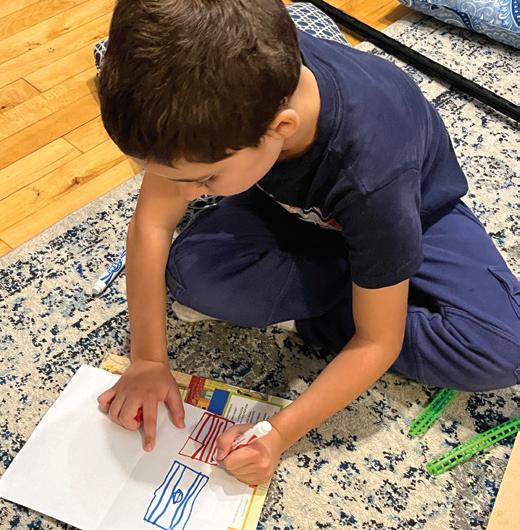
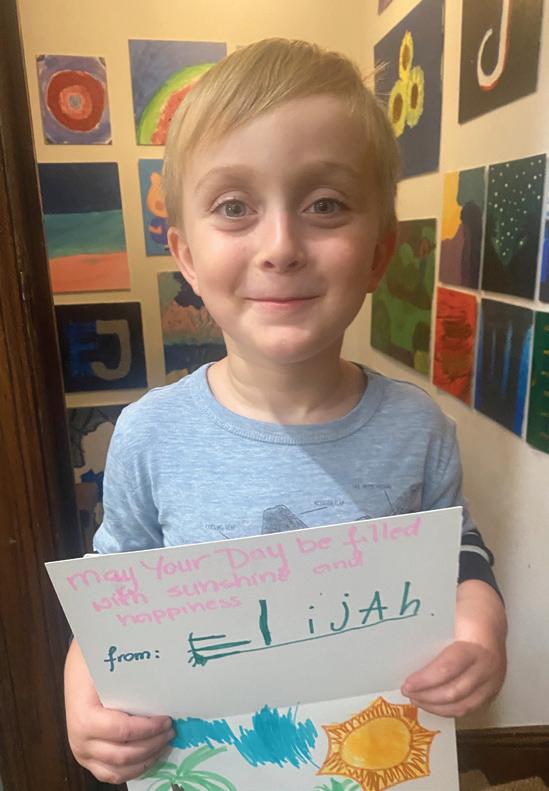
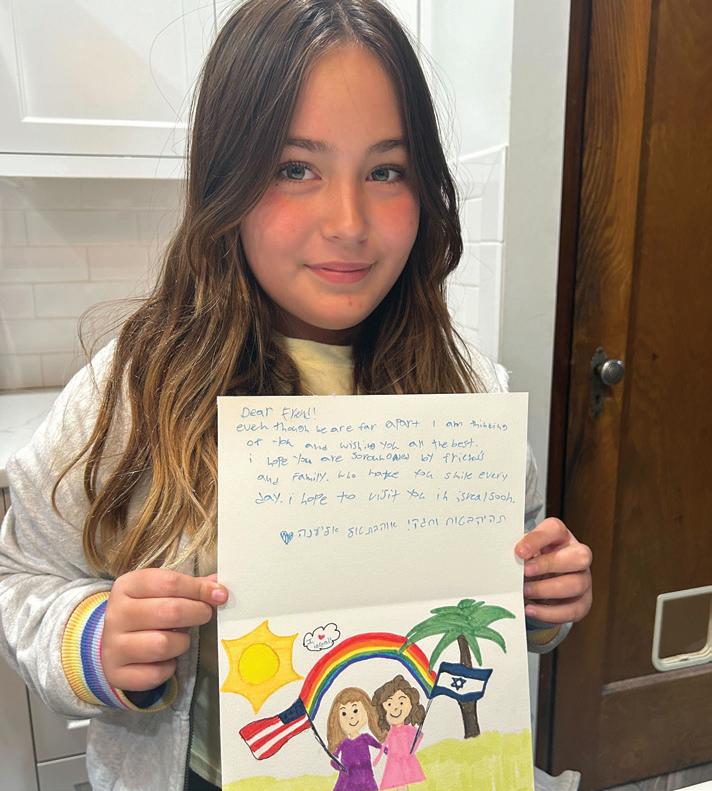
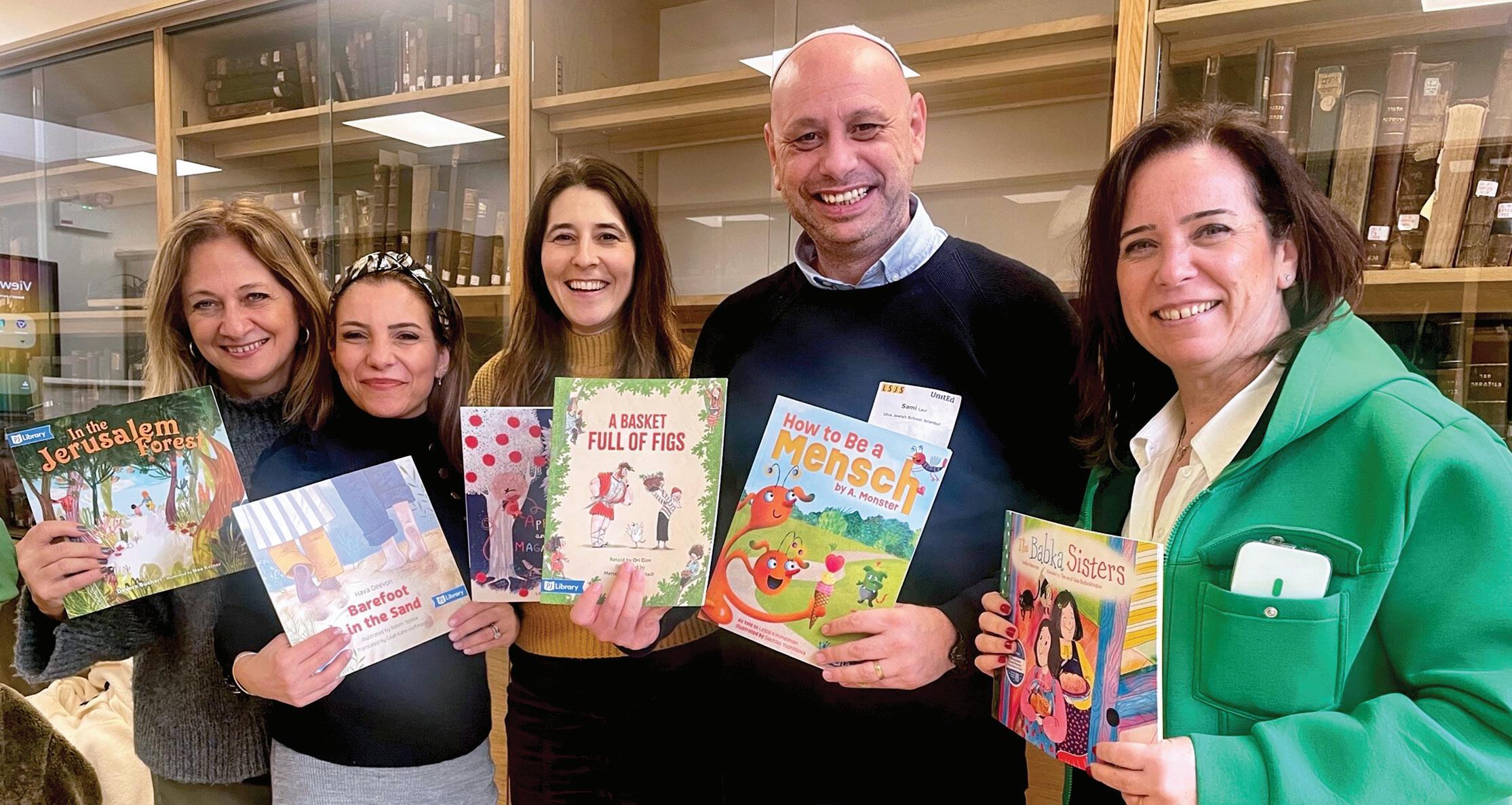
A new PJ Library launch provides learning, fun, and fortitude for Turkey’s Jewish community.
BY RYAN TOROK
Across North America last September, 7-year-olds received the book The Mysterious Guests: A Sukkot Story. In a third-grade classroom in Istanbul, some 20 students read the same story in class that same month (and crafted colorful sukkah decorations) before taking their own copies home.
Jewish-studies classes at Turkey’s Ulus Jewish Schools, a 110-year-old Jewish day school, now feature a new addition: PJ Library books.
PJ Library launched in Turkey in September, distributing books to children at two locations: Ulus Jewish Schools in Istanbul and the Jewish community center in the coastal city of Izmir. Already PJ Library is reaching 230 Turkish Jewish children ages 4-8 with storybooks and a sense of shared connection to the Jewish people.
To start PJ Library in a new country takes months of planning and preparation. No one
Members of PJ Libraryʼs Turkey and UK teams met in London last fall.
PHOTO COURTESY OF LAUREN HAMBURGER
could have anticipated just how relevant PJ Library’s launch would be for Turkey’s Jewish community, a thriving Jewish bastion in a Muslim-majority country.
“It’s very timely that we launched in Turkey last fall and started helping to reinforce a sense of community and global connection through the program,” says Rachel Kozupsky, PJ Library’s director of international programs. “Joyful Jewish experiences are so important nowadays.”
Jewish people have lived in Turkey since antiquity. Many also migrated from the Iberian Peninsula during the Spanish Inquisition, bringing Sephardic culture and the Ladino language with them. Today, Turkey has a Jewish population of about 16,000, most of whom are Sephardic and live in Istanbul, the country’s largest city. Istanbul is home to 19 synagogues along with kosher butcher shops, Jewish businesses and social services, a museum celebrating the rituals and customs of Turkish Jews, and even a Jewish newspaper. Izmir, Turkey’s third-largest city, was once
a flourishing home for Sephardic Jewry; its Jewish population is now about 1,200.
How does PJ Library work in Turkey? Unlike in North America, where books arrive in the mail, books in Turkey are sent directly to the Jewish school and the Jewish community center. Teachers in both locations plan lessons and lead classroom activities based on the books — which are in English — and afterward, children take copies home to enjoy with their families.
“We integrate the PJ Library books into the curriculum and use the books in our lessons to bring the Jewish content to a higher level,” says Sami Levi, Jewish studies coordinator at Ulus Jewish Schools. “The students learn more about Jewish values, traditions, and culture.”
Alongside books based on Sukkot, Hanukkah, and Passover, teachers have led students in classroom discussions, art projects, and creative-writing exercises.
“Our teaching partners in Turkey have been very thoughtful with how they incorporate PJ Library resources,” says Lauren Hamburger, regional director of PJ Library in the UK and Europe. “In the Istanbul and Izmir communities, there’s a high degree of Jewish cultural affiliation. The goal is to bring familiarity with Jewish content to a higher level.”
So far, the approach is working. “The impact of these books is noticeable in our classes. Kids quote characters and events from the books, which helps them practice English and adds to their learning experience,” says Selena Benaved, who oversees PJ Library distribution at the Izmir Jewish community center’s Sunday school. “Kids are excited to get new books each month. Parents mention that their kids love reading the books and even read them to younger siblings before bed.”
“The books are beneficial and fun. My son enjoys them and even taught our family about challah from one of the books,” one mother shares. “We love reading PJ Library books together. The illustrations are fantastic, and they have helped Rami learn about Jewish holidays in a fun way,” says another.
This Jewish education has benefits across generations. “Ultimately, we want our books to reach not just children but the parents,” Hamburger adds.
Thanks to support from the Harold Grinspoon Foundation and generous private donors, PJ Library in Turkey provides a unique point of connection for this historic Jewish community.
“We love reading PJ Library books together.”
A MOTHER IN IZMIR
“It can feel isolating to be Jewish in these times,” Kozupsky says. “Knowing our children are part of such a meaningful shared Jewish experience, within their local community and globally, is comforting. Watching events unfold around the world has been difficult, but I have tremendous hope knowing that families all over are raising their children with the same Jewish stories, values, and connection — a foundation that will help children stand up as proud Jews as they grow.”
Ryan Torok is a freelance writer based in California.
Sarah Hurwit’s in-laws are from Izmir, Turkey. As a means of reconnecting with her husband’s parents’ native city, the Atlanta, Georgia-based PJ Library parent and donor helped lead efforts to bring PJ Library to Turkey. “We’ve been getting PJ Library books for a long time,” Hurwit says of her two children, ages 6 and 8. “There was an opportunity to connect with a community we love, and we wanted to get involved and help.”
For Hurwit, playing a role in PJ Library’s expansion to Turkey has been rewarding beyond expectation.
“It’s been a wonderful experience,” she says, “and it’s deepened my commitment to PJ Library, seeing a glimpse into how thoughtful and intentional they are when doing their partnership building.”
For children around the world, PJ Library is a regular, reliable source of Jewish learning and connection. Because of generous donors like Hurwit, PJ Library can help children everywhere feel a sense of belonging to a wider world united by tradition.
PJ Library gifts books to children in 40-plus countries, on six continents, in seven languages. (Want to know what it’s like launching PJ Library in South America’s largest Jewish community? Look for more in our next issue!) But there is much more work to do. That’s why PJ Library created the International Fund — to bring Jewish stories, values, and joy to even more children.
Make a gift to the PJ Library International Fund and join a community of funding partners ensuring Jewish children across the globe grow up proud to be Jewish. Visit pjlibrary.org/proofgift.
Children are doing their best to make sense of a world marked by antisemitism and war. Here are some tips for parents.
BY SIVAN ZAKAI, PH.D.
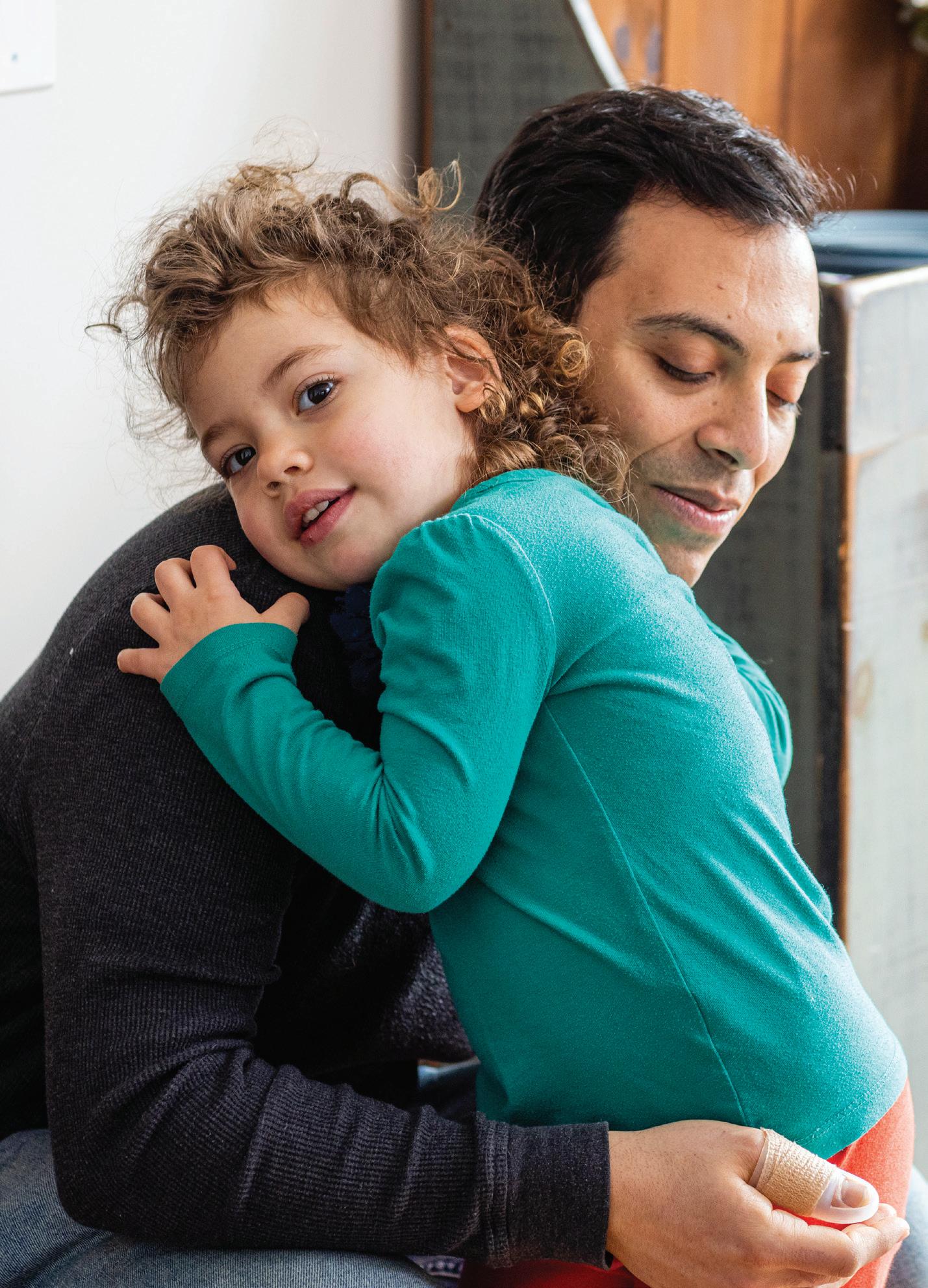
How many people in the world hate Jews? Why do so many people have to die in war? Is it safe to go to my synagogue? What about my school?
What happens to children whose parents have been killed in the war?
As a mother, my heart catches every time I hear small children ask big and difficult questions like these. I grieve that my children and yours are growing up in a world with so much violence and pain. But as a social scientist who studies Jewish children’s thinking, I know that when children ask questions about the darkest aspects of contemporary Jewish life, they are often asking for adult guidance. And that means that as children’s most trusted adults, it’s our responsibility to help them navigate living in a world that is, at once, beautiful and broken.
I’ve spent over a dozen years studying American Jewish children’s ideas, beliefs, and questions during every Israel-Hamas war since 2012, including the one following October 7. In doing so, I’ve come to understand that children often know a lot more about troubling current events than adults typically think they do. Here are a few lessons I’ve learned from listening to children’s ideas.
Children pick up information in bits and pieces wherever they go. Like a big scavenger hunt, they gather clues from their environments: an overheard conversation at a grandparent’s house, an argument with other children at recess, a glimpse at a sign on the highway or a poster, Google or Alexa queries, and details gleaned from school, synagogue, home, and elsewhere. As they collect information, they stitch together an everevolving picture of current events — including the most horrifying ones.
Children do this intellectual and emotional work whether or not they have adults willing to guide them. Therefore, adults have two options: They can let children learn on their own, or they can offer guidance as children attempt to make sense of all that is difficult and confusing about the world.
Many children, like many adults, look at events unfolding in the Middle East and antisemitism rising around the globe and feel
a sense of deep concern. Sometimes, out of a well-intentioned desire to protect children, adults simply reassure them that everything will be OK. But children know when everything is not OK, and they are often seeking strategies — not reassurance — when they turn to adults for guidance.
“Don’t tell me not to worry,” a child named Dina recently told me as she reflected on her interactions with her parents and teachers.
“If you tell me everything’s alright, I know you’re lying. But if you tell me what to do when things aren’t alright, then I start to feel a little better.”
I tried to keep Dina’s words in mind during a conversation earlier this year with my own elementary-school-age child.
“I’m feeling very sad and very worried,” he announced, “but I don’t really want to talk about it because I’m afraid then I’ll make you sad and worried.”
“The only thing worse than being sad and worried,” I reminded him, “is feeling that way all alone. I’m here with you and I want to know about your thoughts and feelings. What do you want to share with me?”
He took a deep breath and explained, “I recently saw posters of the hostages, and there are just so many of them! Still, after all this time. And it makes me feel sad and worried.”
“I feel sad and worried too,” I admitted, “so we’re in this together. What do we know about how to cope when we feel these feelings?”
This subtle shift — from “don’t worry” to “what can we do when we feel worry?” — is essential for helping children cope with living in an uncertain world.
As children consider big, intractable problems in the world, they may respond by offering creative solutions. “Someone should build a giant countdown timer that can be seen on both sides of the Israel-Gaza border,” a child told me. “And then when it reaches zero, everyone should put down their guns at the exact same time, and there will be no more fighting.”
“The leaders of Israel and Hamas should be sent to the International Space Station,” proposed another child. “From space, they’ll be able to see that we all live on the same planet and that we have to work together to protect it and one another.”
One way to interpret children’s ideas is to view them as naive attempts to solve complex
Children know when everything is not OK, and they are often seeking strategies — not reassurance — when they turn to adults for guidance.
geopolitical problems. If adults view children’s ideas in this light, we’re likely to either dismiss or correct them. “Unfortunately, that would never work,” we might say.
But if we view children’s ideas not as simplistic solutions but rather as articulations of a deep desire to create a better world than the one in which we currently live, then another response is possible. “I hear that you’re really concerned about the ongoing fighting and want to live in a more peaceful world,” we might say instead. “I don’t think you or I can control who gets to board the International Space Station, and we don’t decide what happens at the Israel-Gaza border, but we can definitely do things to help the situation. What is within our power to do to help people who are in danger or in mourning because of this war?”
When presented with an opportunity, most children can come up with concrete ways that they can personally contribute to the world they’d like to live in. Some children choose to bake cookies or sell their artwork to benefit organizations that reflect their values. Others believe in the transformative power of prayer or simple acts of kindness as a way of building a better world. When children offer fantastical solutions to complex problems, they’re often taking the first step toward articulating more modest and within-reach ways they can personally help alleviate the suffering of others.
As children make sense of living in uncertain times, they have two fundamental needs: to better understand the world as it is and to be taken seriously in their desire to create a better world. As parents, our task is to help children do both. We can do this by answering children’s questions about the broken world that exists and asking children questions about the more peaceful world that should exist.
Sivan Zakai, Ph.D., is the Sara S. Lee Associate Professor of Jewish Education at Hebrew Union College-Jewish Institute of Religion. Her books include My SecondFavorite Country: How American Jewish Children Think About Israel and Teaching Israel: Studies of Pedagogy from the Field.
For more parenting resources from PJ Library, visit pjlibrary.org/blog or pjlibrary.org/israel.
For small PJ Library communities, a bit of smart funding can go a long way.
BY SASKIA SWENSON MOSS, ENGAGEMENT OFFICER
PJ Library reaches families across the US and Canada — from those living in larger, well-resourced Jewish communities to those in more remote locations where they may be the only Jewish family. Raising a child without a large Jewish population nearby can feel isolating, but with donor support, PJ Library family-engagement professionals work hard to create a warm, inclusive kehillah (community).
Gifts to small communities help ensure that Jewish families everywhere feel seen, supported, and connected. Every dollar makes a difference — the impact may surprise you.
In the summer of 2020, Asheville was growing. Ashley Lasher, the executive director of the Asheville Jewish Community Center, hired Geri Garfinkel-Gershon as the new Jewish lifelong engagement director, responsible for PJ Library family engagement. “People are moving to Asheville for a variety of reasons,” says Garfinkel-Gershon. “Some are looking for good school systems and all are looking for community.”
At the time, 59 children were signed up for PJ Library, but over 100 more were on a waitlist to receive books. COVID-19 was spreading, families were staying home, and Lasher knew PJ Library offered a lifeline families could count on to safely deliver Jewish connection to children.
Lasher and Garfinkel-Gershon made the bold decision to enroll everyone on the waitlist. Their subscription numbers soared, and so did their costs.
That fall, Lasher and Garfinkel-Gershon received a $5,000 gift from the David and Janet Polak Foundation. The gift came at a crucial time. To support their new PJ Library subscriptions, they were preparing to launch a fundraising campaign. They immediately decided to use the $5,000 as a matching gift. With the funds they received, Lasher and Garfinkel-Gershon not only covered the cost of their PJ Library subscriptions but also
Shelley Hubal began hosting family programs thanks to donor support.
brought families together at a “PJ in the Park” event the following spring.
“This gift from the Polak family,” says Garfinkel-Gershon, “we don’t call it a gift — we call it an opportunity. We were able to afford all our subscriptions, and even with all the families still moving to Asheville, we continue to be able to say, ‘No more waiting list!’”

Shelley Hubal is a one-woman show in the small community of Binghamton. As director of the Jewish Federation of Greater Binghamton, she wears many hats including that of PJ Library familyengagement professional.
“Small communities are often overlooked, but when you specifically help a small community, a little bit goes far.”
SHELLEY HUBAL
When Hubal first started as director in 2019, there were families waiting to have their subscriptions renewed and new families eager to begin receiving books. Hubal’s board was committed, but her budget was tiny.
In December 2022, Hubal’s community received what she called “a Hanukkah gift.”
The Donald Etra Futures Fund, recognizing that Binghamton had potential to grow, gifted the community $2,000 to help cover subscription costs.
With this vital support, Hubal was able to do three things she hadn’t been able to do before. First, she removed the waitlist and began sending books to every family who wanted them. Second, she hosted a family
“Judaism has to be accessible everywhere.” —Anna Etra
program for the first time. “The timing was right, the weather was good; we met outdoors at the JCC playground and sang Purim songs,” Hubal recalls. “And people just kept coming!”
And finally, Hubal leveraged the gift to raise additional local funds to keep PJ Library active. “Small communities are often overlooked,” she notes, “but when you specifically help a small community, a little bit goes far. Thanks to this initial gift from the Etra Fund, I could relax into the task at hand. I could reach out to families and welcome them to PJ Library.”
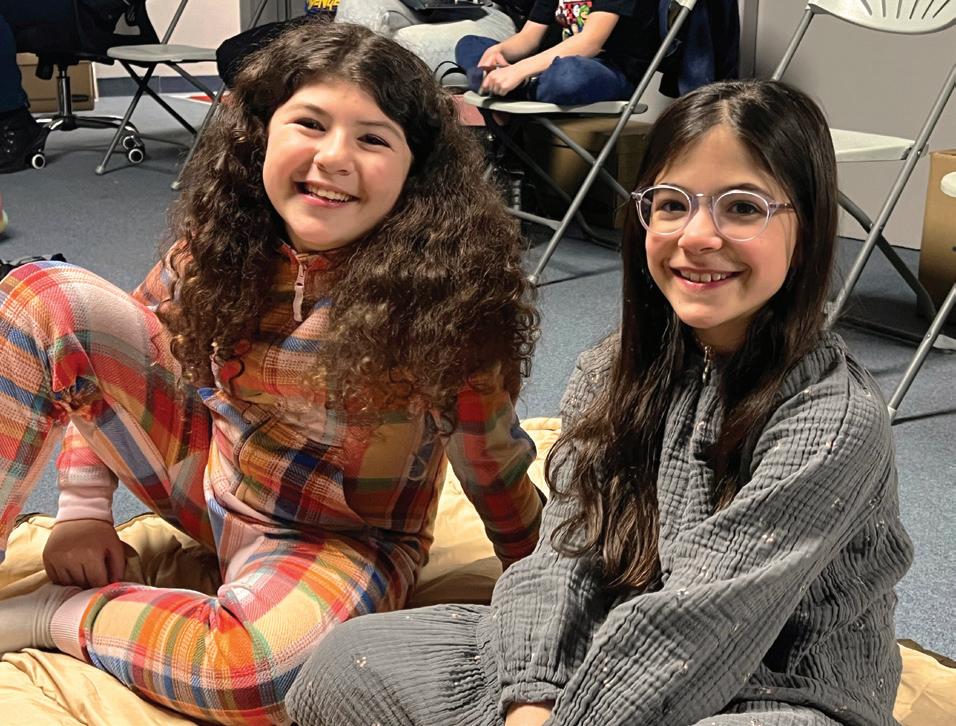
Hamilton, a city southwest of Toronto known for waterfalls and green hiking trails, grew rapidly during the pandemic as families sought a smaller community to call home. The growth was so explosive that by October 2022, the Hamilton Jewish Federation had close to 100 new children on its PJ Library waitlist.
That’s when Gustavo Rymberg, the Federation’s chief executive officer, received some good news: Robert and Amy Arogeti were celebrating Amy’s birthday and wanted to make a gift to help Jewish communities struggling during the pandemic.
Hamilton’s PJ Library waitlist was the perfect place to start. The Arogetis made a gift of $3,500, and within days, all 100 kids were newly signed up to receive beautiful Jewish storybooks.
Elaine Levine, the Federation’s campaign director, launched a campaign to match the gift. Thanks to generous local donors, she secured matching funds that allowed the
Donald Etra had a simple motto: “You’re never alone if you’re with a book.” That’s why his family decided to give to PJ Library through the Donald Etra Futures Fund, the charitable fund they created in his memory, says his daughter Anna Etra. Gifts made by the Donald Etra Futures Fund have helped small communities across the country serve more families in more ways.
A crucial gift allowed 100 new children in Hamilton to receive PJ Library books.
Why support small communities? Living in Los Angeles and New York, Anna says, “we’ve always had the privilege of living in a big, thriving Jewish community. But we know so many Jewish people live outside of those big Jewish hubs in the US. It’s important to support the growth of smaller Jewish communities. Judaism has to be accessible everywhere.”
Seeing the impact of the family’s gifts has been rewarding. “It goes to show that every dollar counts,” Anna says. “A community can grow exponentially with a small donation. Even one additional child receiving the books or participating in a PJ Library activity is so important. It could change someone’s relationship with Judaism.”
Federation to create a family-engagement strategy and begin offering inclusive Jewish experiences to meet families’ needs. “We had a responsibility to find a match to give PJ Library the dignity and respect it deserves and to show we are all in,” Levine says.
Why is PJ Library such a priority for the Hamilton Jewish Federation? “PJ Library is filling a gap for families that don’t always affiliate with a synagogue,” says PJ Library family-engagement professional Maggie Norris. “Thanks to this gift, we put PJ Library back on the map in Hamilton.”
PJ Library provides Jewish connection to families near and far. Want to make a difference in a small PJ Library community? Reach out to us at development@hgf.org to speak to our staff about communities where your investment can make an impact.
I’ve
been receiving PJ Library books for as long as
I can remember. Their lessons have stayed with me
over the years.
BY MICAH BLACHMAN
Editor’s note: PROOF magazine is proud to work with a variety of talented writers. Here we’re thrilled to welcome PJ Library subscriber Micah Blachman, age 10, as a PROOF contributor reflecting on some of his favorite books.

WFavorite books can take on new meaning over time.
COURTESY OF MICAH BLACHMAN
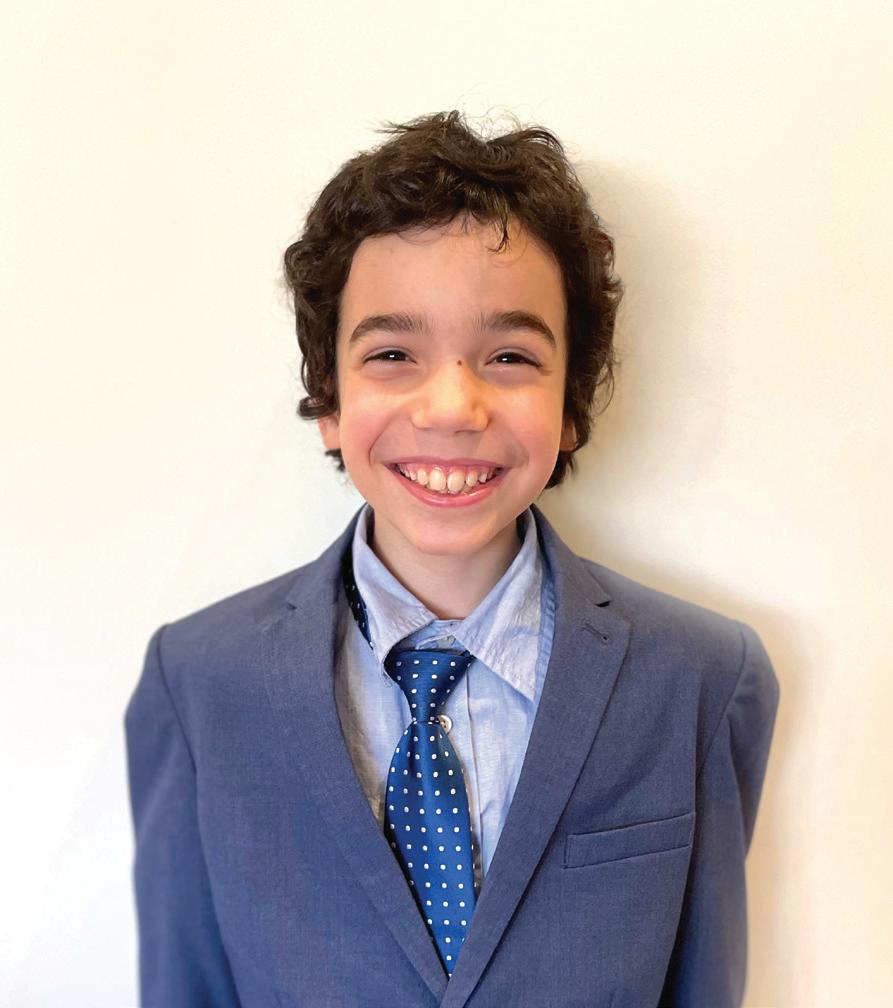
hen you outgrow clothes, you can always look back and appreciate the designs. You can also do that with PJ Library books. The “design” for PJ Library books is the part that sticks with you years after you’ve finished the book — the Jewish value.
I’m 10 years old, and I’ve been receiving PJ Library books for practically my whole life (I now choose my own books through PJ Our Way, PJ Library’s extension program for kids ages 9-12). Certain PJ Library books have stuck with me over time because I can still relate to the values. Here are a few I’d like to share with you.
Written and
illustrated
by Margot Zemach
Published by Macmillan
situation to, his perception changes and he is able to be grateful for what he previously had. Bad and good are relative and depend on your perspective. As a pianist, pieces that looked hard to me years ago now feel easy because I’ve now done much harder things. When compared to the past, my perception is different.





A classic Yiddish folktale, this book teaches us about gratitude. At first, a man is upset by how noisy his family is, which makes life in his crowded one-room hut unbearable. But then his rabbi tells him to bring his goat, cow, and chickens into the




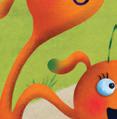
















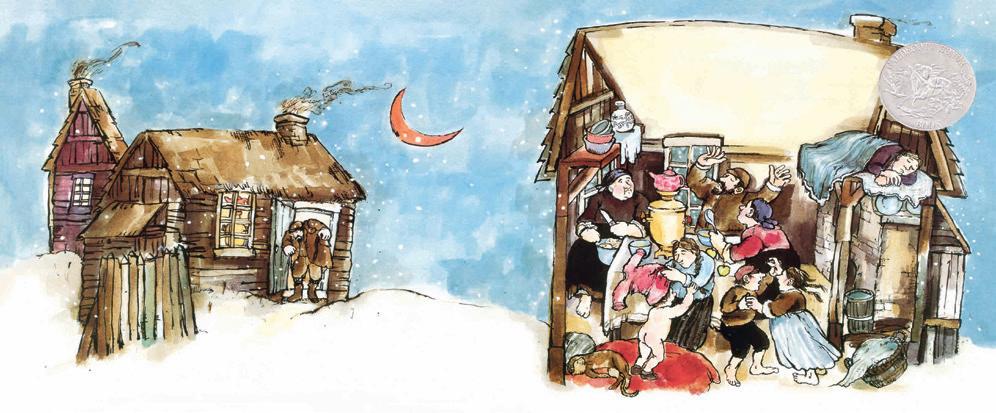

Written by Leslie Kimmelman
Illustrated by Sachiko Yoshikawa
Published by Apples and Honey Press


This book teaches us the values of kindness and inclusion. Through whimsical pictures of helpful monsters, this book illustrates the point that anyone can be nice, no matter their appearance. By not judging monsters (or, in the applicable lesson, people), you are being kind. This book connects to the proverb, “don’t judge a book by its cover.”
It shows us that just because someone is different from us doesn’t mean we should treat them differently. We all need kindness and sometimes a helping hand. Earlier this year at my school, we welcomed Israeli children (one of whom was in my class) whose schools had closed. It felt really rewarding to help people in need.


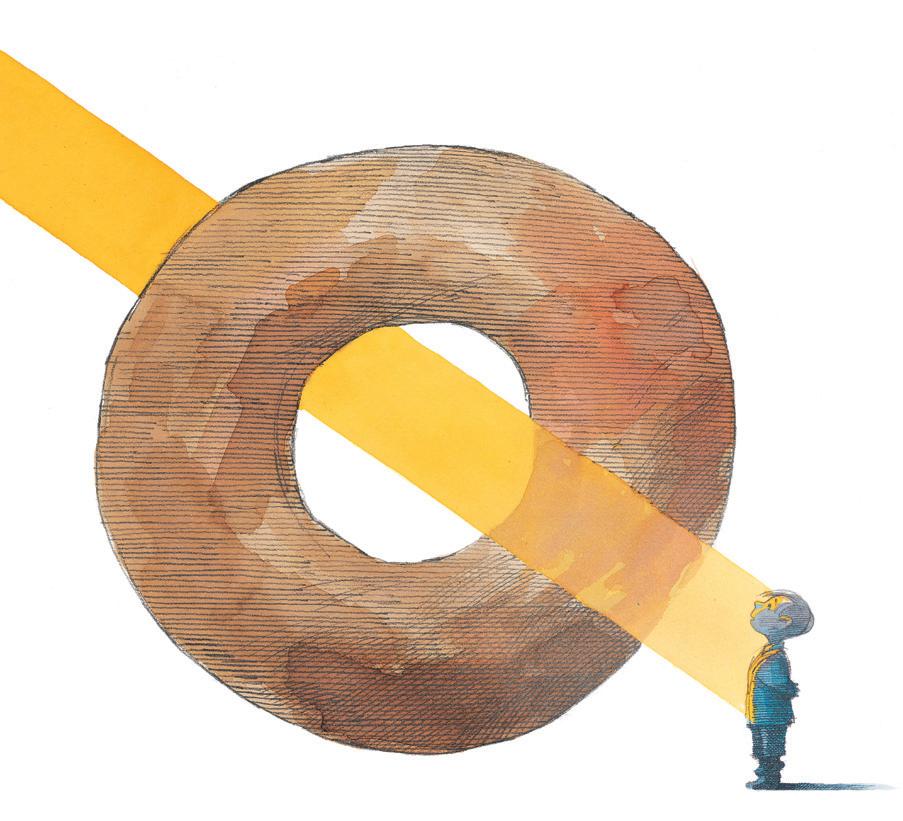

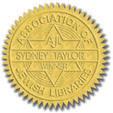
Written by Aubrey Davis
Illustrated by Dušan Petričić
Published by Kids Can Press
In this book, Benny’s grandfather, a baker, teaches Benny a lesson about giving thanks. Although Benny’s grandfather is the one who bakes the bagels, he teaches Benny that he is not the one deserving of thanks; instead, Benny should thank God. To do so, each week Benny asks his grandfather to give him a big bag of bagels, which he then puts into the synagogue’s holy ark. Little does he know, a poor man visits the ark weekly and takes the bagels to eat. On the surface, this book teaches the lesson that feeding the hungry helps make the world a better place. But there are other lessons too. When Benny’s grandfather first sees him putting bagels in the ark, he yells at him because he doesn’t know Benny’s intentions. But what Benny was doing wasn’t bad — he was just trying to thank God for the bagels. We can’t always make judgments based on our initial instinct. For me, each year I am afraid to get a flu shot (mostly because I don’t remember how much it hurt or didnʼt hurt the previous year). But then when I get it, it hurts for a second, and I realize that it wasn’t nearly as painful as I anticipated. Sometimes assumptions turn out not to be true.
These books have taken on new meaning for me now that I’m older. No matter your age, you can still take out your old PJ Library books and see how their Jewish values fit in your life!
Micah Blachman lives in New York and is going into sixth grade. He enjoys crossword puzzles, Scrabble, and writing short stories.
Kids of all ages love PJ Library books. Did you know they can also put on their headphones and tune in to PJ Library’s original podcasts? Children (and their families) are discovering even more storytelling joy on PJ Library’s award-winning podcast network, PJ Library Presents. In fact, families have downloaded PJ Library podcasts over 1 million times!
Afternoons with Mimi is a storytime podcast that invites young children to listen as everyone’s favorite grandmother — Mimi — reads PJ Library books, Jewish folktales, and original stories designed to capture the imagination. Afternoons with Mimi is now a two-time Webby Awards honoree!









Beyond the Bookcase, a fantasy series for older children, allows listeners to follow a group of friends as they adventure to a magical land where familiar fairy tales come to life. Beyond the Bookcase is a 2023 Signal Awards silver winner!
Radio Chitaika is PJ Library’s new Russian- and Ukrainian-language podcast. Families can enjoy 10 episodes featuring familiar Jewish folktales and favorite PJ Library books, all in Russian or Ukrainian.
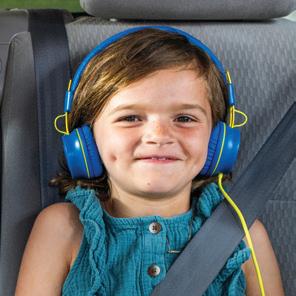
PJ Library podcasts are available on the Yoto Player, the Kids Listen app, and anywhere else you listen to podcasts. You can also hear episodes at pjlibrary.org/podcast.
Does your child understand Hebrew? Check out Yarden and Didi in Pajamas, a new Hebrew-language children’s podcast produced by the Israel Broadcasting Authority in partnership with Sifriyat Pijama, PJ Library’s sister program in Israel. Stories, songs, and poems — in Hebrew — enliven each episode. Scan the QR code to listen!
A
PJ Library grandmother and granddaughter shared a special moment
in Israel: becoming bat mitzvah together.
BY RACHEL WETTER ADVANCEMENT COORDINATOR
Suniva Achuthan celebrated her bat mitzvah in the summer of 2023 in a unique location. In the courtyard of the Israel Antiquities Authority — a timeless oasis in the bustling city of Jerusalem — she read from the ancient text of the Torah surrounded by precious artifacts from the land where many of the Torah’s stories are set.
But for Suniva, now 16, it was less about the locale. “Honestly, for me, it was just special to do it with my grandma,” she says. Suniva wasn’t the only one celebrating her bat mitzvah that day; Shelby White, her grandmother, read Torah for the first time right alongside her.
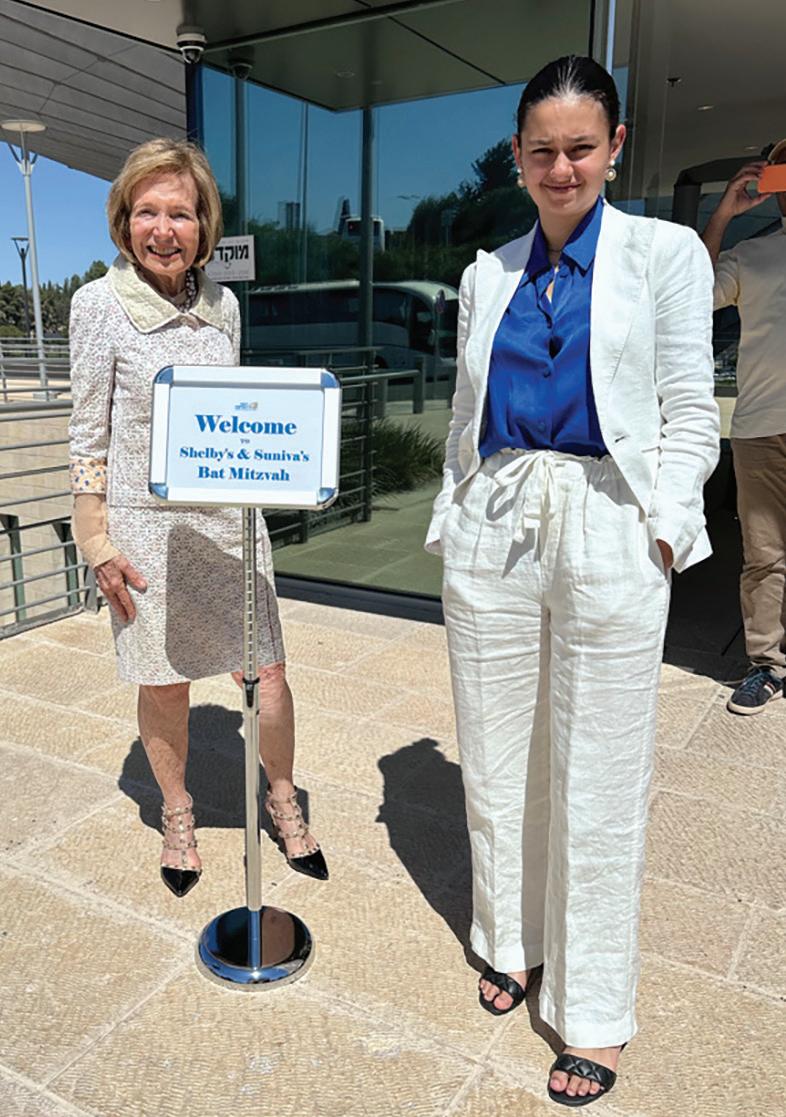
B’nai mitzvah (“children of the commandment”) ceremonies mark a Jewish young adult’s coming-of-age. Usually celebrated around age 13, the ritual often involves chanting from the Torah. But in previous generations, the practice was less common for girls.
“When I grew up, in a Conservative Jewish family, girls were pretty much marginalized,” recalls Shelby. “There was a huge deal made over my brother’s bar mitzvah but nothing when it came to me. So that’s why, as an octogenarian, the idea came into my head. And I was thrilled when Suniva said, ‘I’ll do it with you, Grandma.’ I called Rabbi David Levy Reiner at Congregation Shir Shalom in Ridgefield, Connecticut, where I’ve belonged for over 30 years. He agreed to help. Suniva and I began an intense course of study with Cantor Hayley in Scarsdale, New York. We had weekly sessions, using flash cards to learn Hebrew for the big day.”
Before Shelby asked her, Suniva hadn’t been certain she wanted a bat mitzvah ceremony. Turning 13 during the pandemic meant extra precautions, and as the daughter of a Jewish mother and a Hindu father, she wasn’t yet sure what Judaism meant to her. But Shelby’s
Shelby White and her granddaughter, Suniva Achuthan, in Israel for their double bat mitzvah last summer.
PHOTO
COURTESY OF TRACY WHITE
invitation gave her a reason: She wanted to experience this occasion with her grandmother and support Shelby as she celebrated her own Jewish milestone.
Shelby has always loved Judaism and Jewish culture. Sharing that love with her grandchildren, she felt, was an important part of her role as a grandmother. That’s why she had PJ Library books come to her house — so she could help pass Judaism l’dor vador (from generation to generation).
“When I was younger, every single time Grandma came over, she would bring a new PJ Library book and we would read them together,” Suniva recalls. Besides providing moments of connection for the family, the books helped Suniva learn more about the Jewish rituals her family practiced.
Shelby has taken her appreciation for PJ Library a step further: She has chosen to give financial support through her late husband’s foundation. “Our foundation does a lot to support Jewish culture, and this is a great program,” she says. “My grandchildren loved the books when they were little. PJ Library gave me books about the holidays that I could give to them so they would feel they were learning on their own.”
Although Suniva and her siblings have graduated from PJ Library, the Leon Levy Foundation continues to help PJ Library share Jewish culture, history, and values with the next generation.
“It’s the way I was brought up,” Shelby says, “and I want them to have the same experience of this wonderful tradition that we have.”
DONORS AT ALL LEVELS HELP SPREAD THE JOY OF PJ LIBRARY. Join Shelby with a gift today! Visit pjlibrary.org/proofgift.
BY WINNIE SANDLER GRINSPOON PRESIDENT, HAROLD GRINSPOON FOUNDATION
“Abba, are we going to die?”
As we stood among the incinerated structures of Kibbutz Be’eri this past March, a father of two young children recounted for us the harrowing hours his family spent hiding in their safe room on that terrible day in October as the sounds of gunfire and explosions reverberated outside.
“We are not going to die,” he answered in a firm, quiet voice. “I am here to block this door, and I am strong. And when it is safe to leave, we will go somewhere safe. Now you need to start making a list in your mind of what you will take that can fit in your backpack. Remember ... in your mind, without speaking ...”
He shared how the terrifying blasts continued outside for hours, and the texts from his neighbors grew dire. People started to text their goodbyes. His in-laws stopped answering messages. Yet he couldn’t react. He was focused on keeping his kids from speaking or crying. If he could keep his family hidden, perhaps they’d survive.
I visited Kibbutz Be’eri this past spring with a group of funders who support projects in Israel, such as Sifriyat Pijama and Maktabat al-Fanoos — programs the Harold Grinspoon Foundation is proud to help fund. These programs provide free books to hundreds of thousands of children throughout Israel, both Jewish and Arab, thanks to a partnership between generous donors and Israel’s Ministry of Education. For Israeli kids, these books are a beloved part of childhood.
It broke my heart to receive a photo taken at Kibbutz Be’eri in the days after the massacre. The photo showed a child’s bookcase filled with Sifriyat Pijama storybooks. Horrifically, the books were stained with blood.
Israel is a country that mourns together. Seemingly everyone knows someone who has had a family member die in war or be killed by terror. In the weeks and months following the October 7 attack, the country united with an outpouring of support. Thousands of people showed up at the funerals of victims they had never met, and volunteers helped to feed, clothe, relocate, and comfort thousands of families. Many have visited the Tel Aviv plaza
We appreciate the power of books to bring calm, connection, and a bit of normalcy to children and their families in very difficult times.
now known as Hostages Square in solidarity with families waiting for their loved ones to come home. As one mother, whose son was kidnapped and died in Gaza, told us, only in Israel could she survive such a thing. The shared connection of the Israeli people is what gives her the strength to persevere.
As our rabbis teach us, all of Am Yisrael — the Jewish people — are responsible for one another. Whether we live in Israel or in the diaspora, we are part of an extended family. We also have a unique responsibility to the Jewish state and all its citizens. That’s why the Harold Grinspoon Foundation invests in books in both Hebrew and Arabic — so that Israeli children of all backgrounds can start life with a strong foundation. We know the benefits of early-childhood literacy, and we appreciate the power of books to bring calm, connection, and a bit of normalcy to children and their families in very difficult times. I hope you will join us in supporting this work.
We look forward to the day when all displaced families can return to their homes in safety and security, and we will make sure there are beautiful new storybooks and resources waiting for them.
March.

GRINSPOON
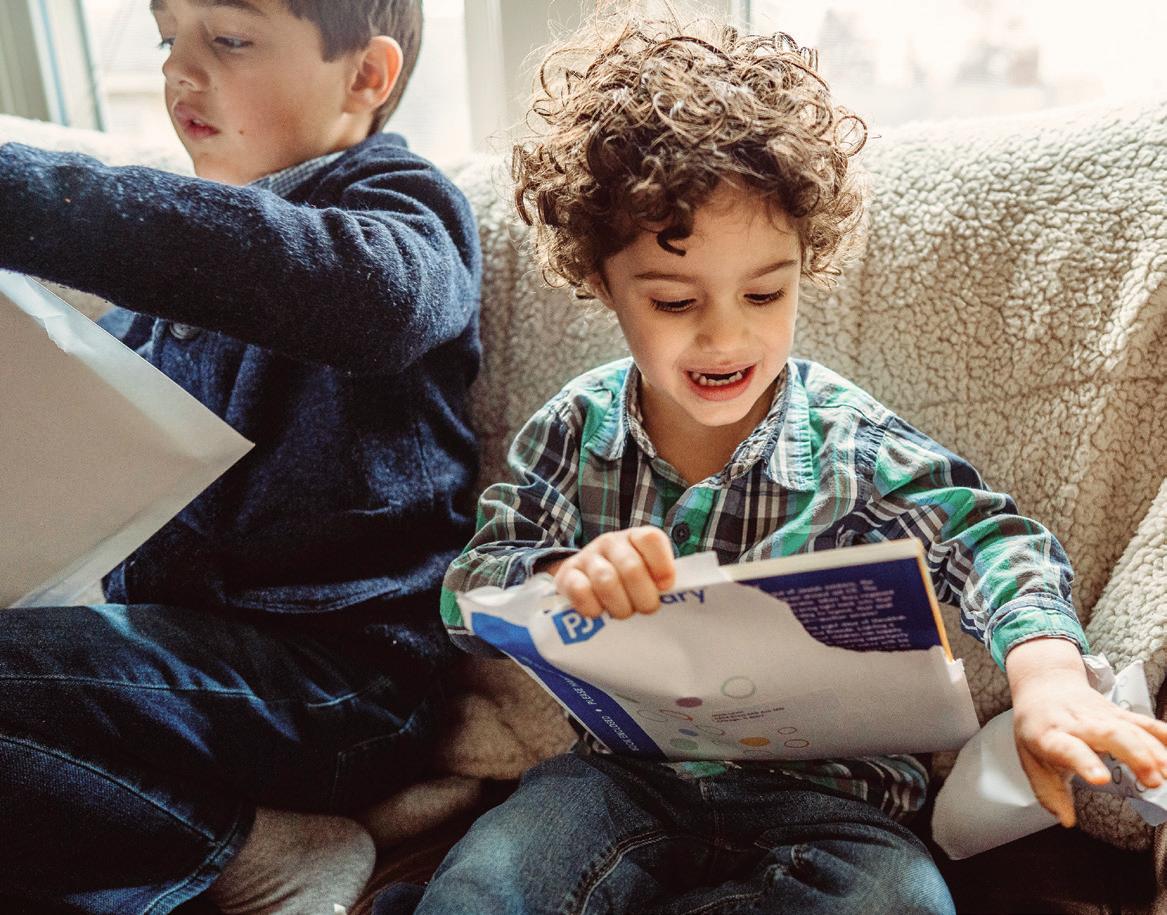
keeps PJ Library free for families? You do. Visit pjlibrary.org/proofgift or scan the QR code to make your gift. To learn more, contact development@hgf.org. For $18 a month, you can give a year of PJ Library to three children — in your town, across the globe, or in Israel.
Be a hero to another Jewish family and become a recurring monthly donor today.